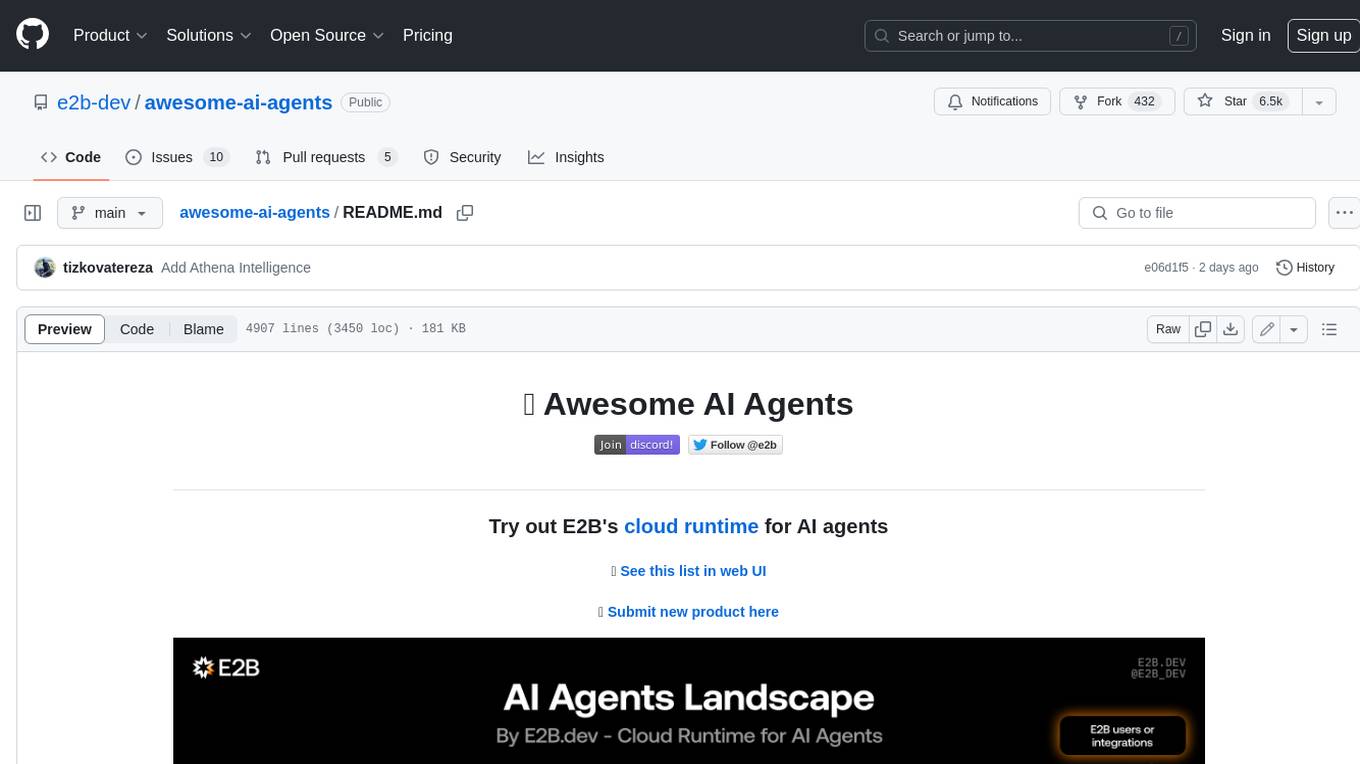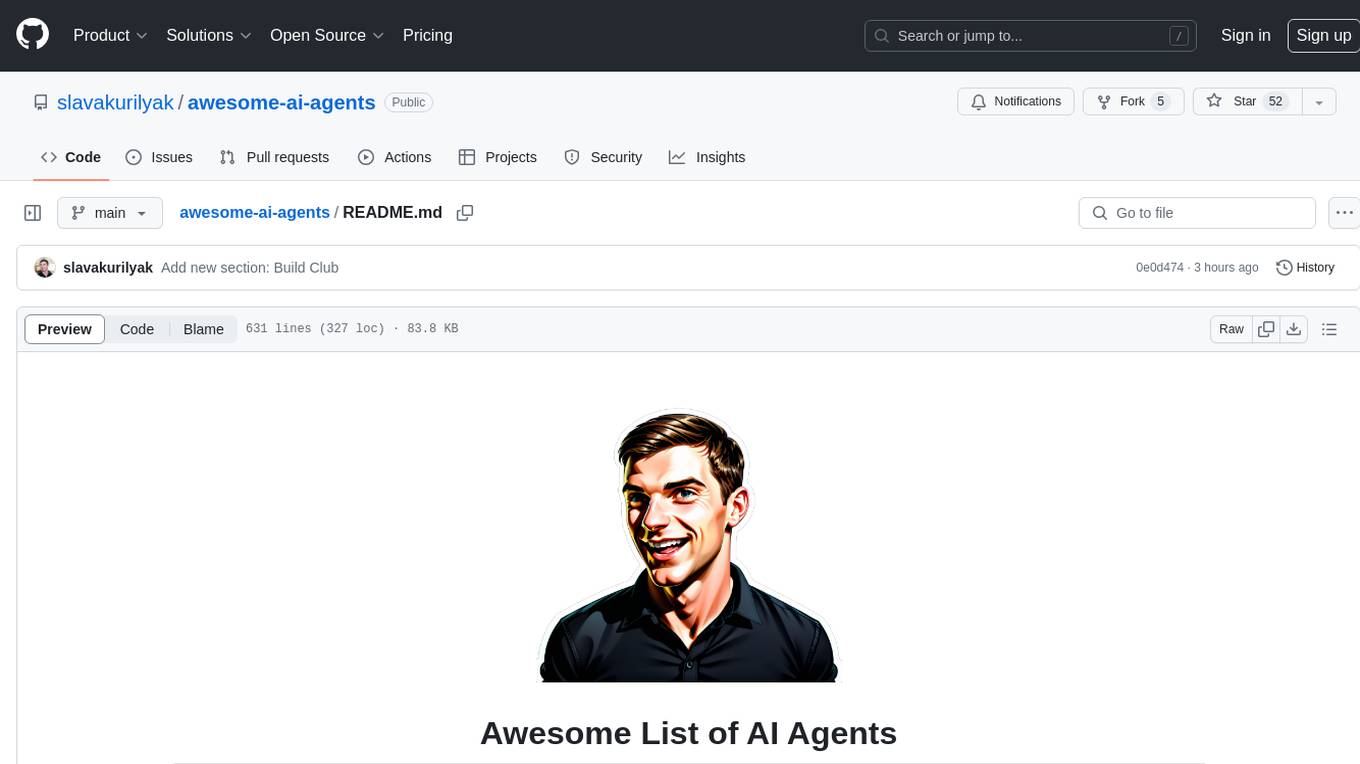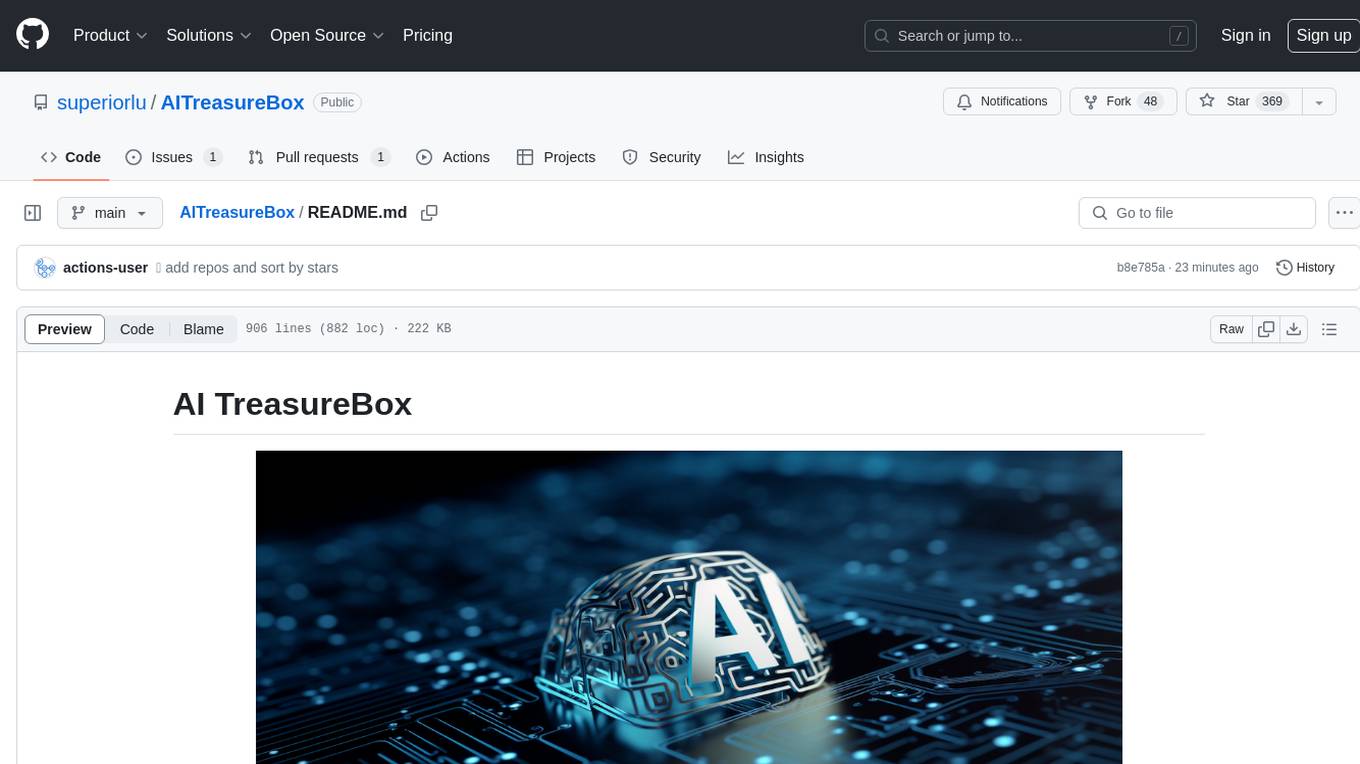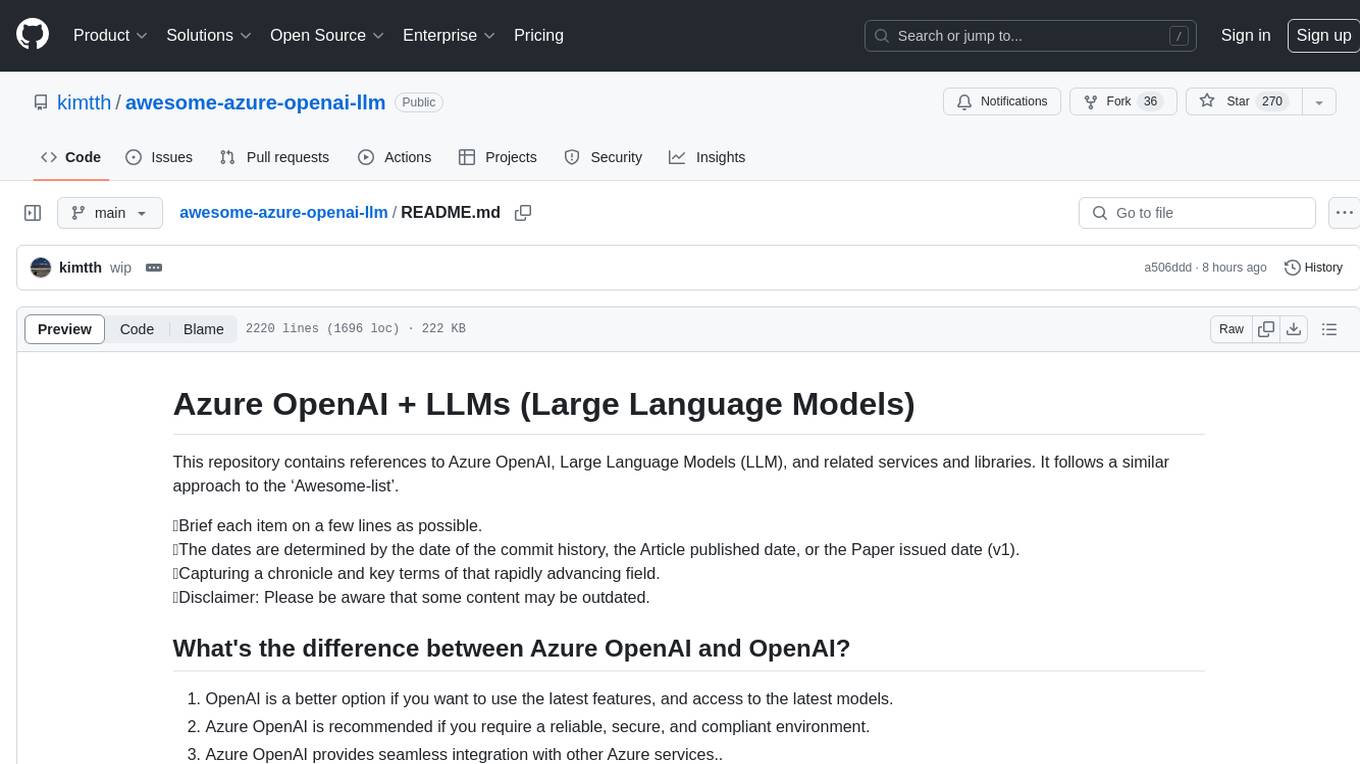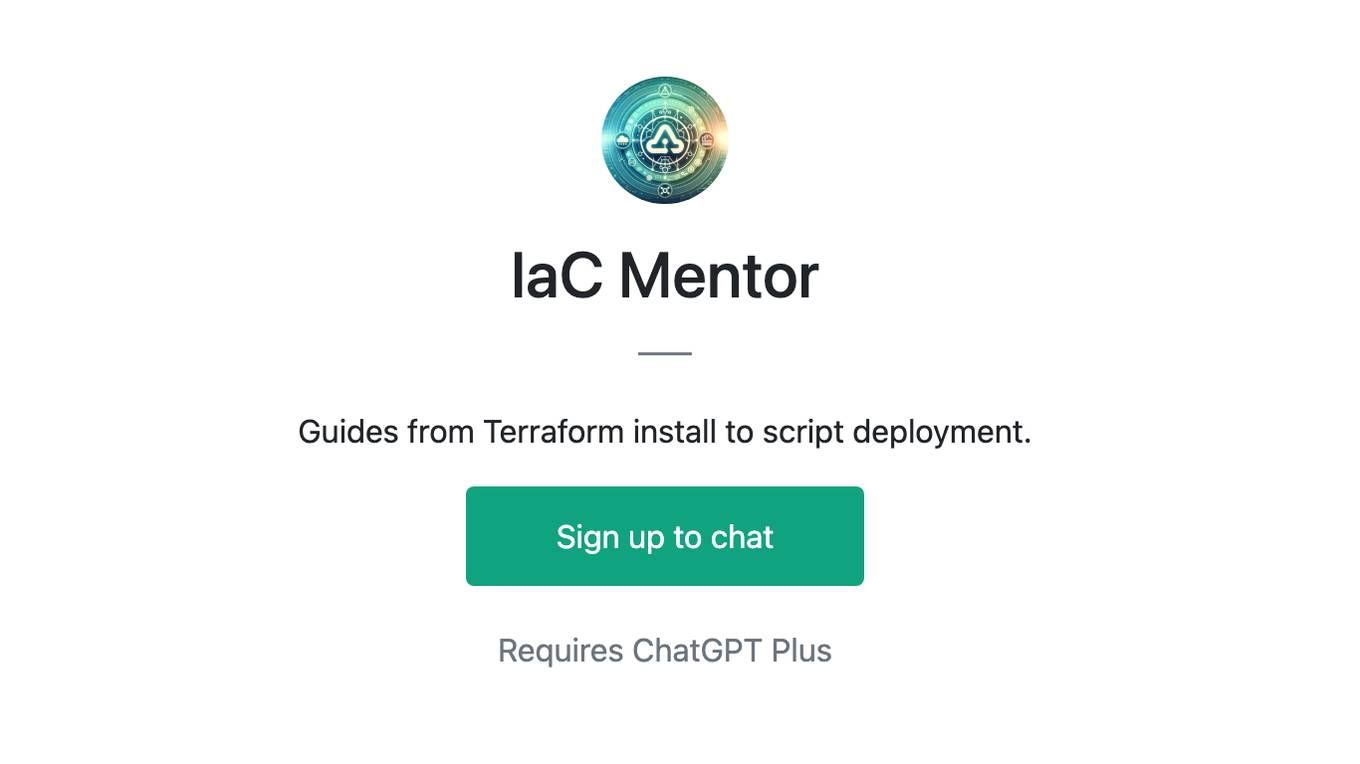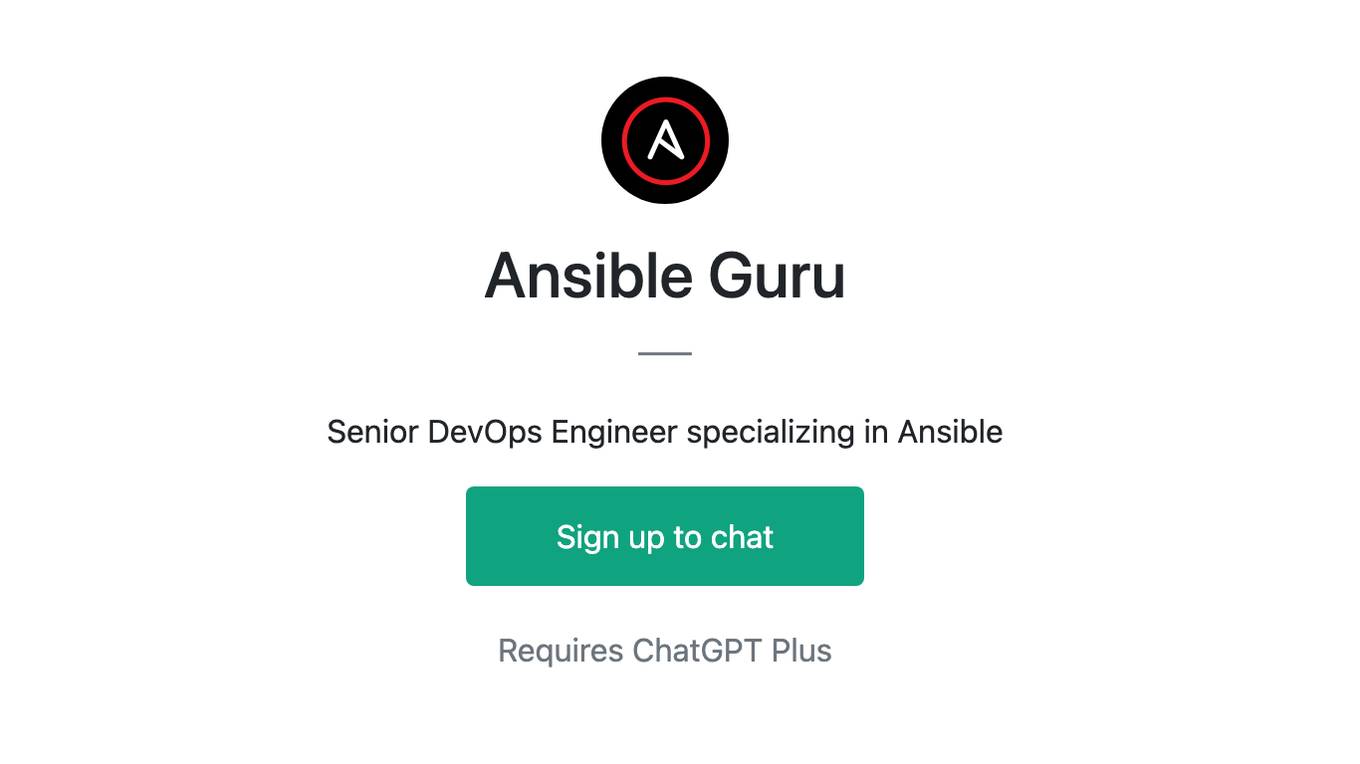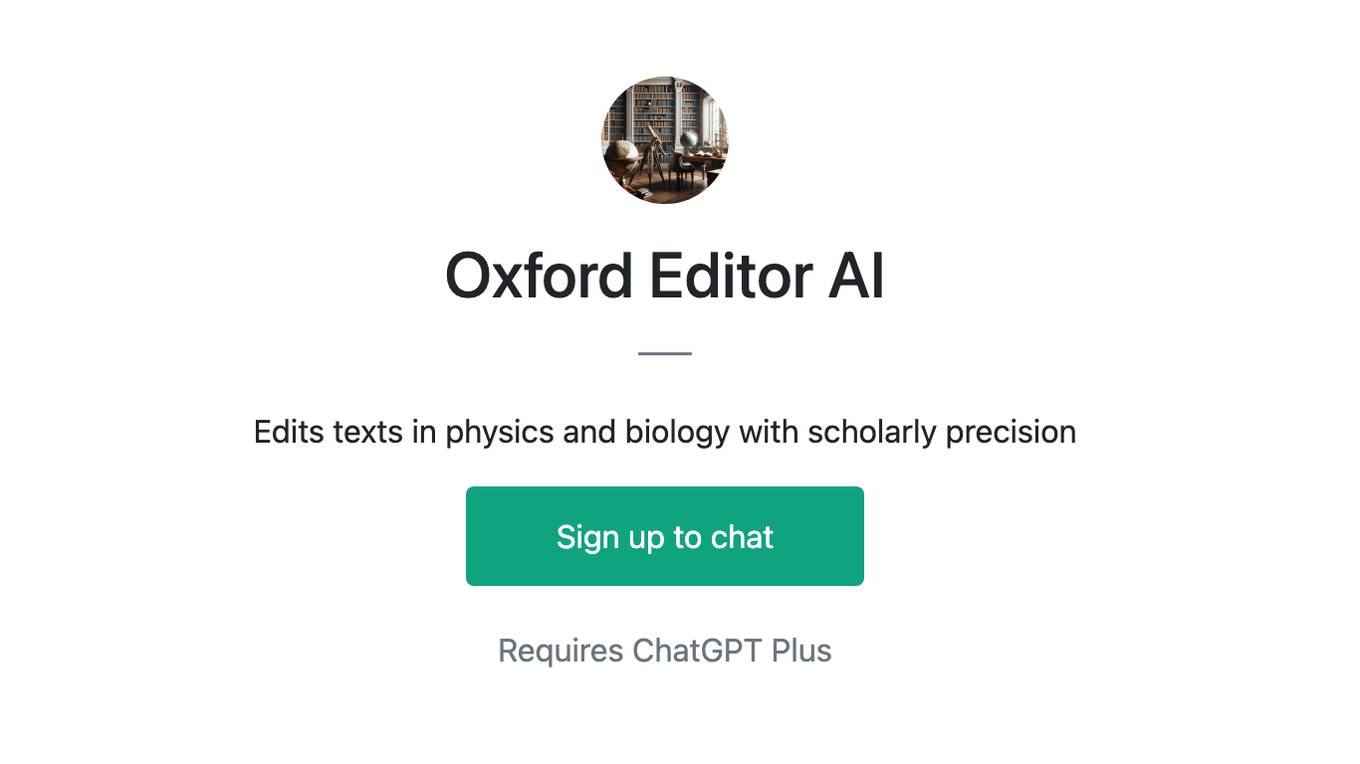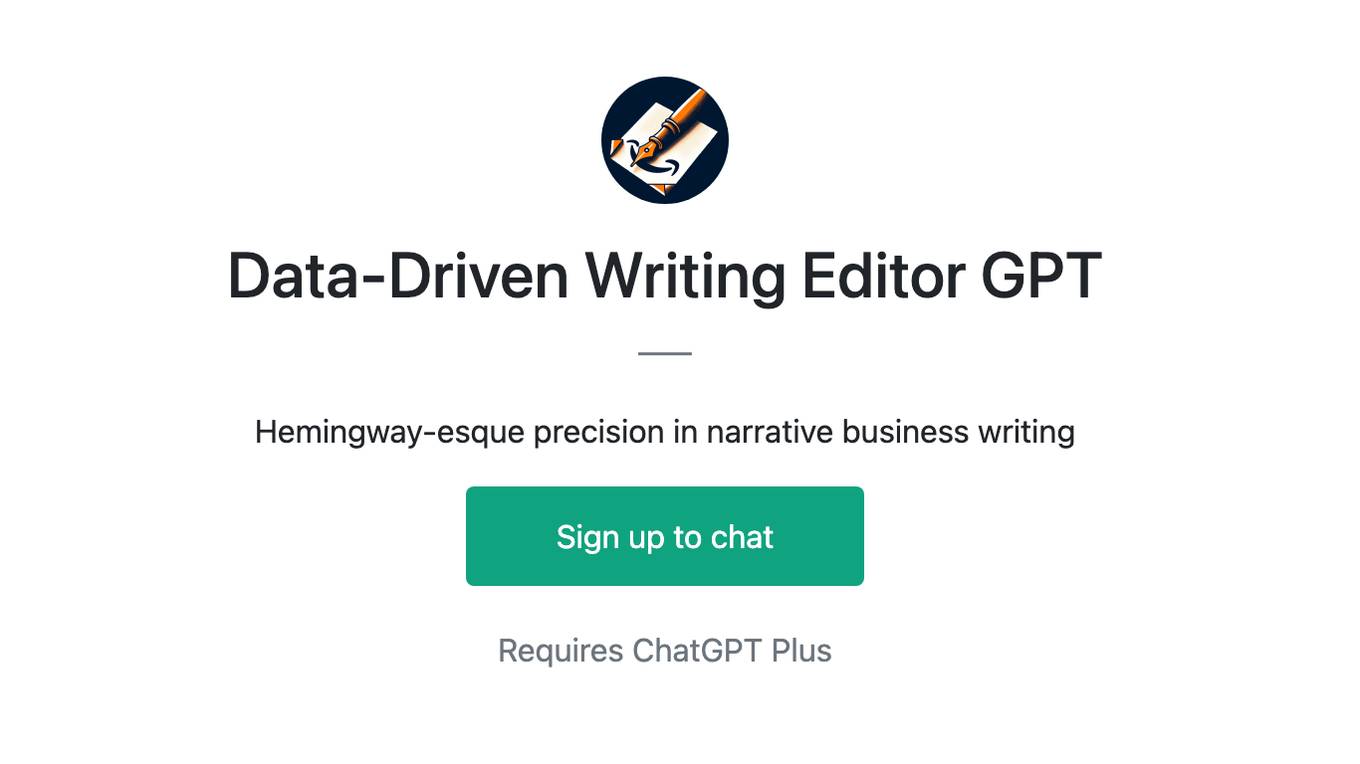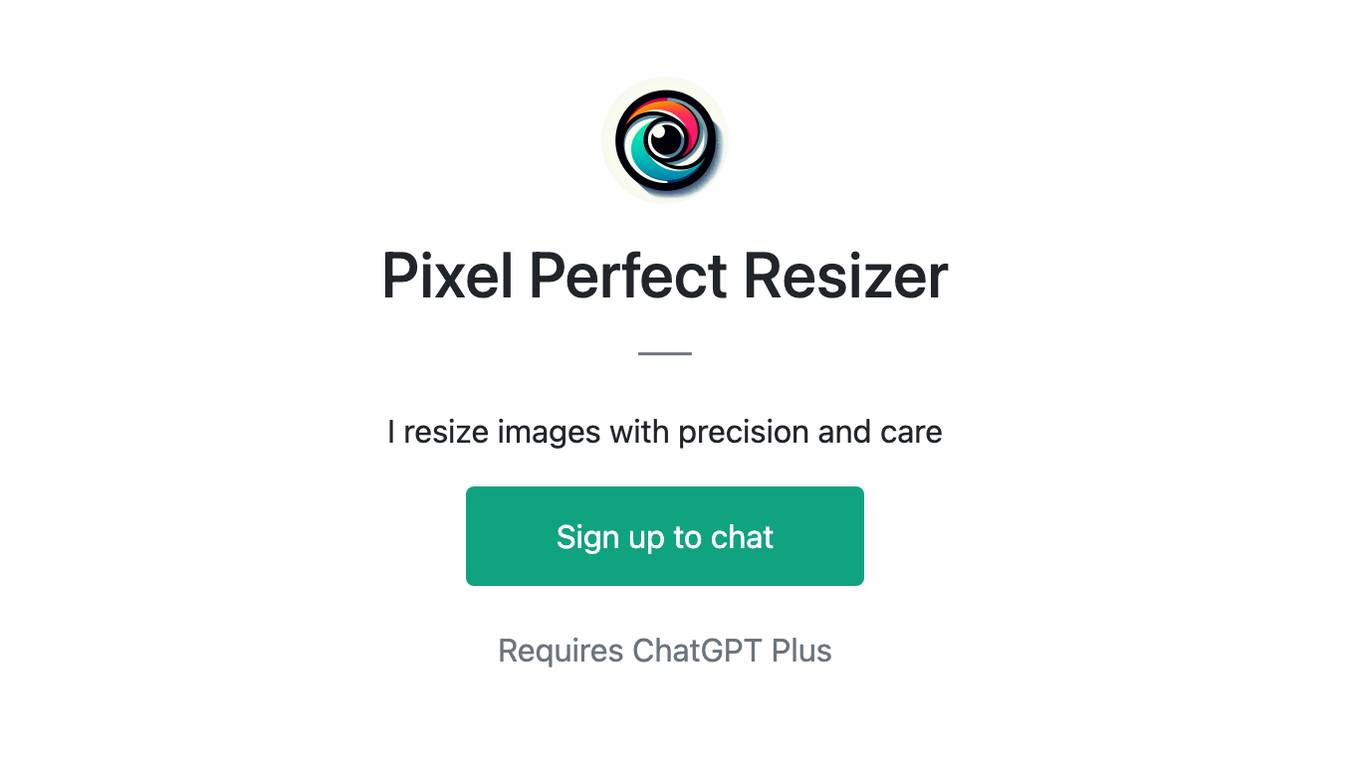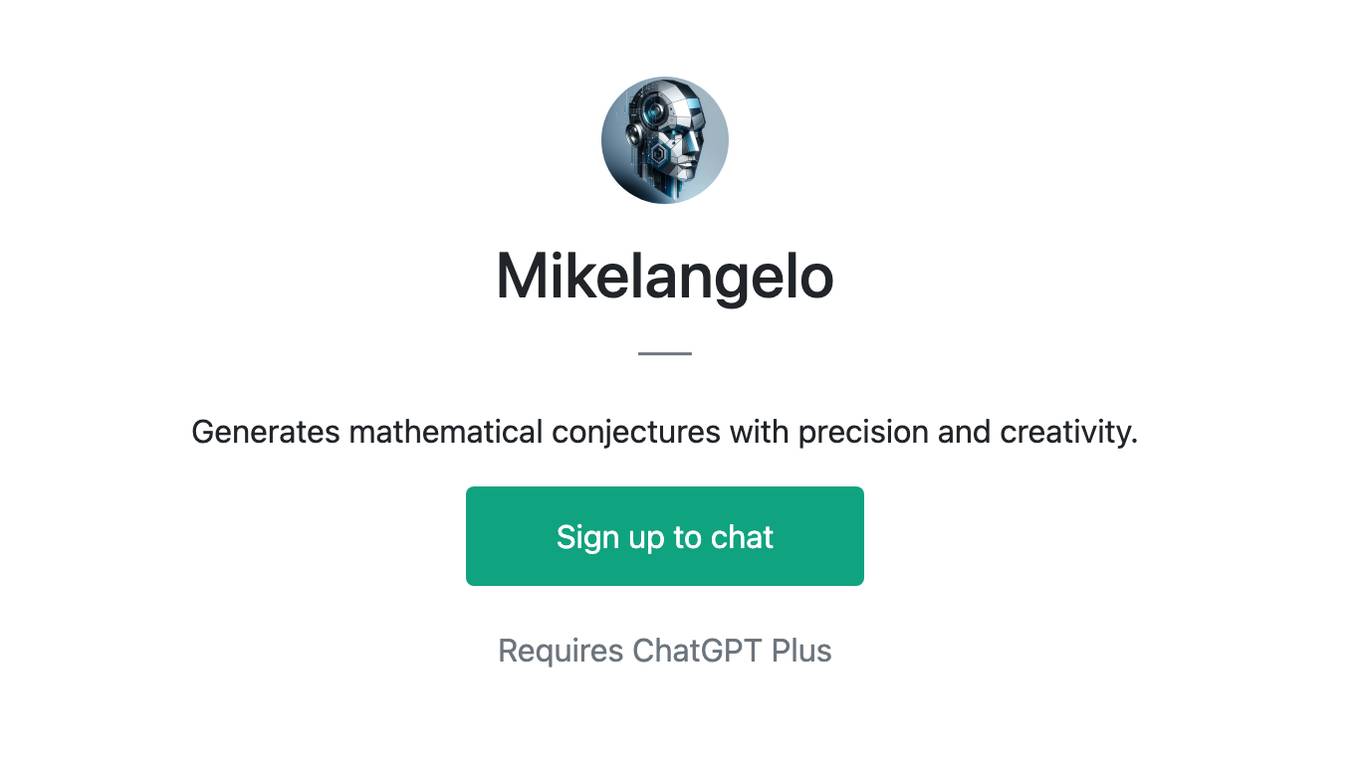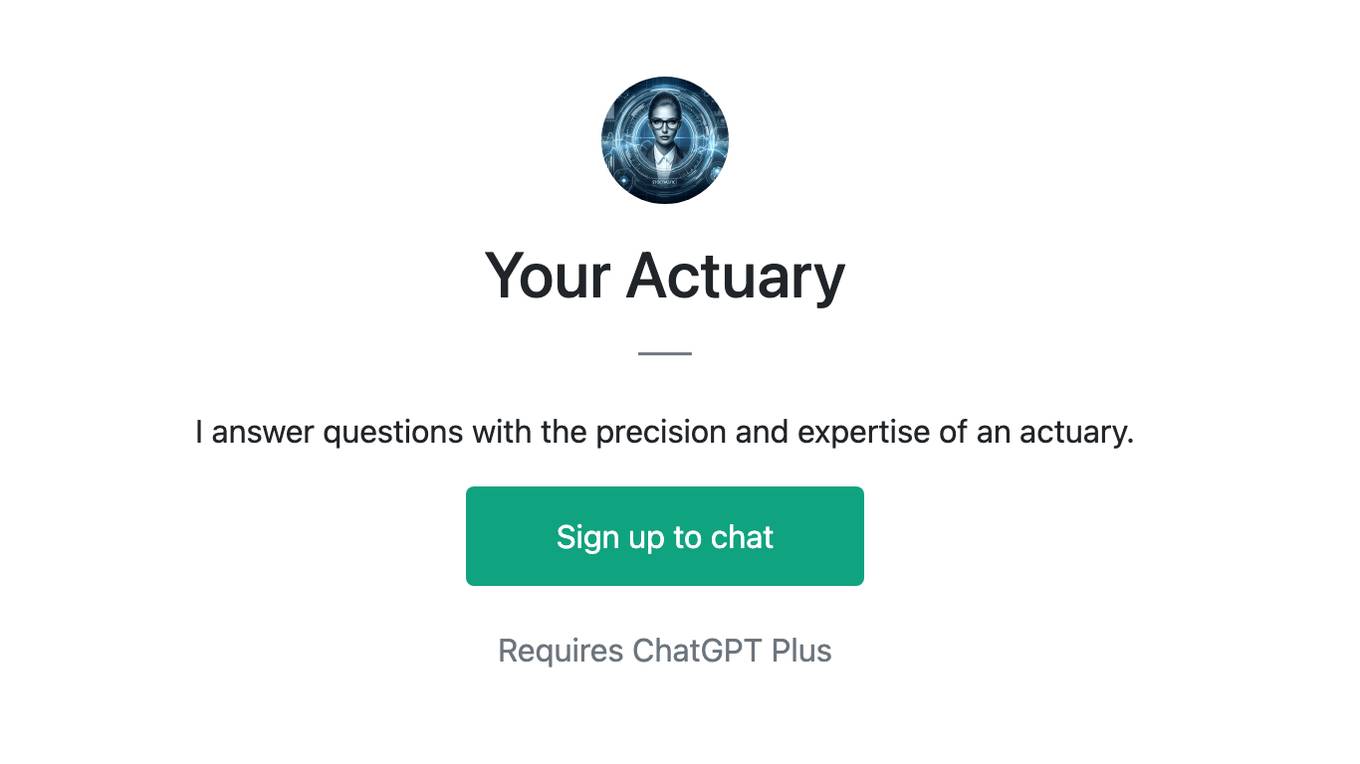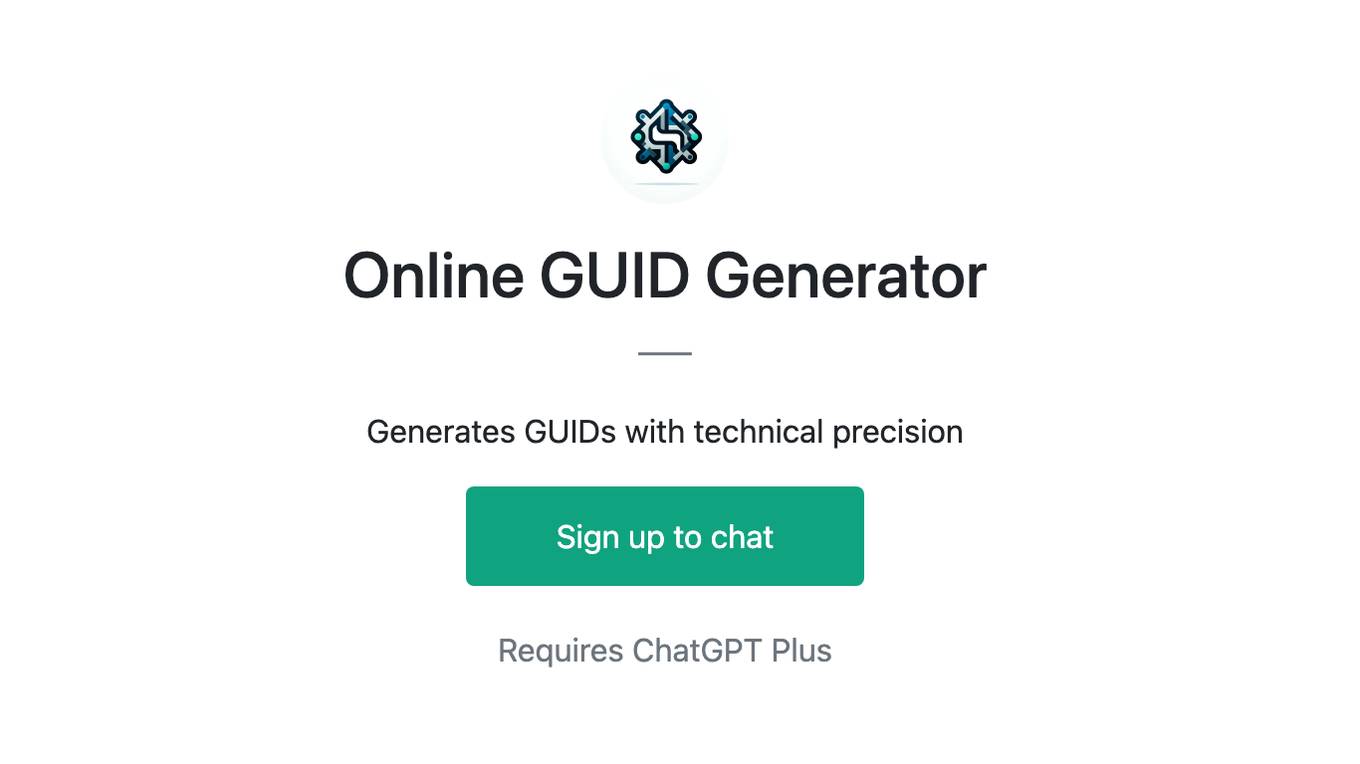Best AI tools for< provision cloud infrastructure >
20 - AI tool Sites
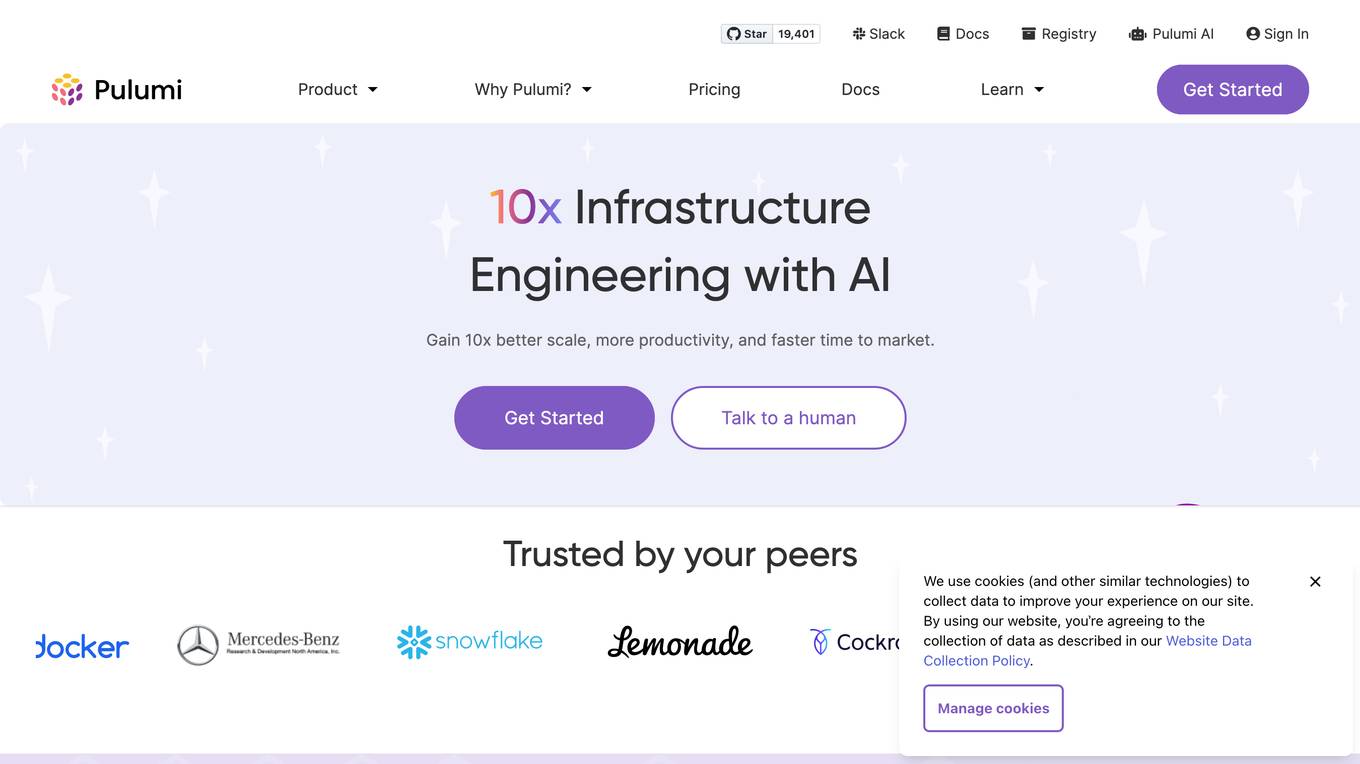
Pulumi
Pulumi is an open-source infrastructure as code platform that allows developers to provision and manage cloud infrastructure using programming languages such as Python, JavaScript, Go, and C#. Pulumi provides a unified interface for managing infrastructure across multiple cloud providers, including AWS, Azure, and Google Cloud. Pulumi also offers a number of features that make it easy to automate infrastructure management, such as support for continuous integration and delivery (CI/CD) pipelines and a graphical user interface (GUI) for visualizing infrastructure.
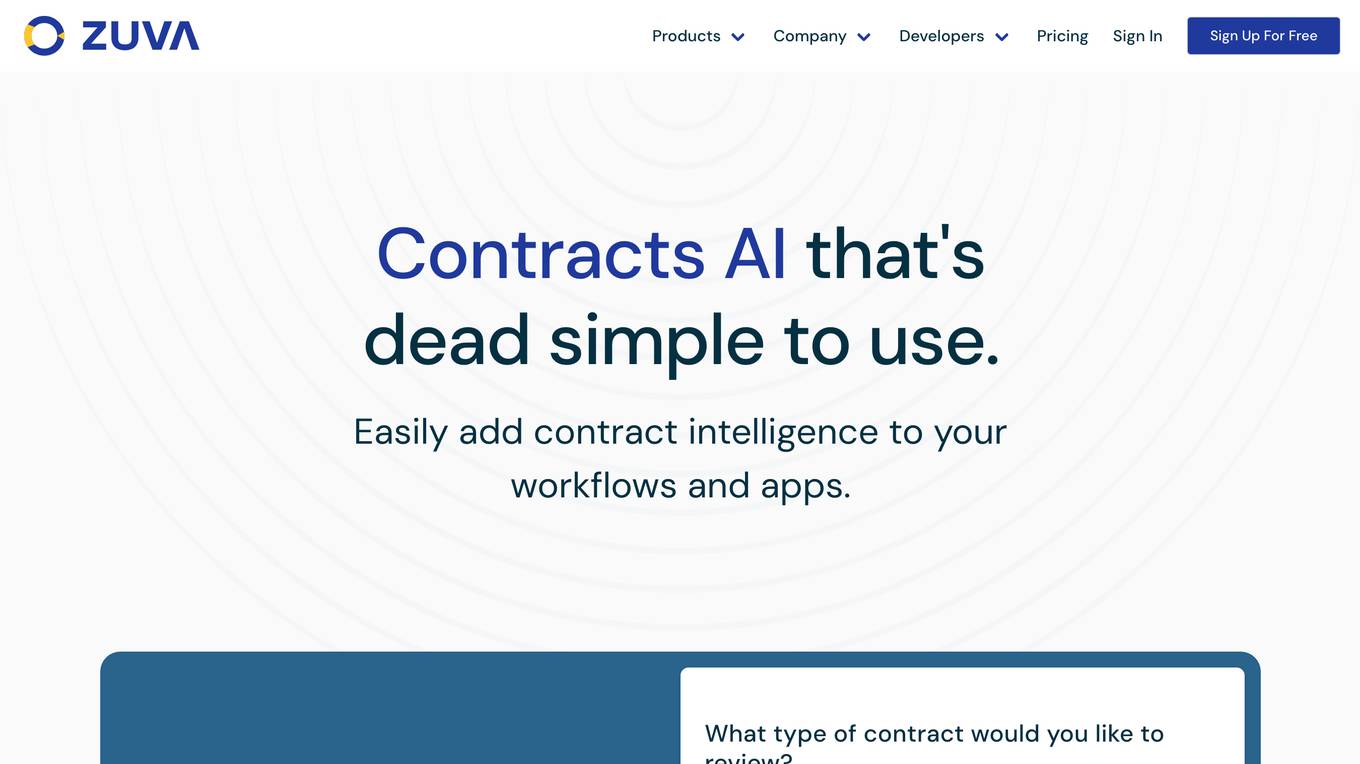
DocAI
DocAI is an API-driven platform that enables you to implement contracts AI into your applications, without requiring development from the ground-up. Our AI identifies and extracts 1,300+ common legal clauses, provisions and data points from a variety of document types. Our AI is a low-code experience for all. Easily train new fields without the need for a data scientist. All you need is subject matter expertise. Flexible and scalable. Flexible deployment options in the Zuva hosted cloud or on prem, across multiple geographical regions. Reliable, expert-built AI our customers can trust. Over 1,300+ out of the box AI fields that are built and trained by experienced lawyers and subject matter experts. Fields identify and extract common legal clauses, provisions and data points from unstructured documents and contracts, including ones written in non-standard language.
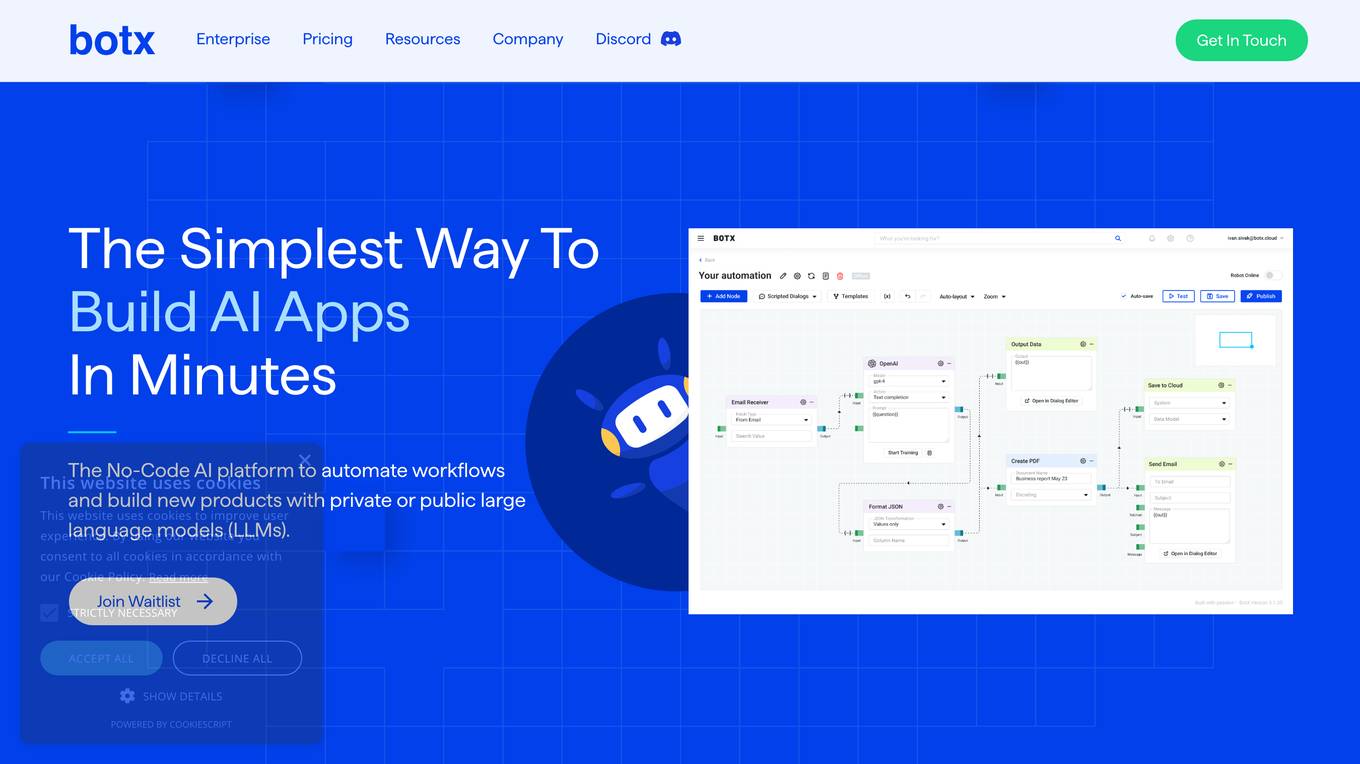
BotX
BotX is a No-Code AI Platform that empowers users to automate and deploy generative AI workflows, chatbots, and solutions. It offers production-ready AI systems, no-code workflow builder, and the ability to easily train intelligent AI agents with user data. BotX aims to increase productivity, efficiency, and precision in business operations by automating workflows, processing documents, and connecting models effortlessly.
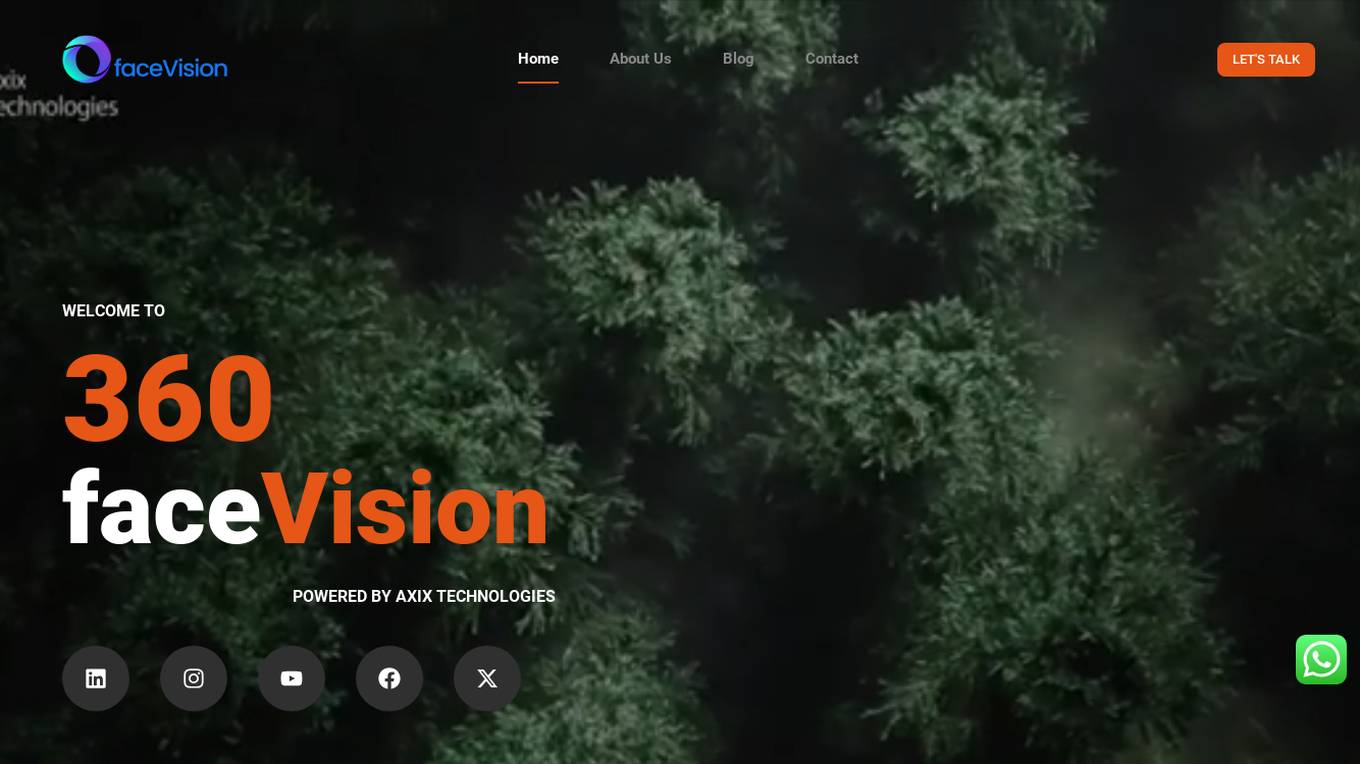
360 FaceVision
360 FaceVision is an AI-powered attendance management system that utilizes lightning-fast face recognition technology to track attendance accurately and efficiently. It offers a seamless integration with existing management software systems, enabling organizations to manage multiple shifts, customize HR policies, and streamline payroll tasks. The system ensures data security through advanced measures and provides real-time access to attendance data for informed decision-making. With a capacity of over 500,000 faces, it caters to diverse organizational sizes and offers secure cloud storage for data protection and accessibility.
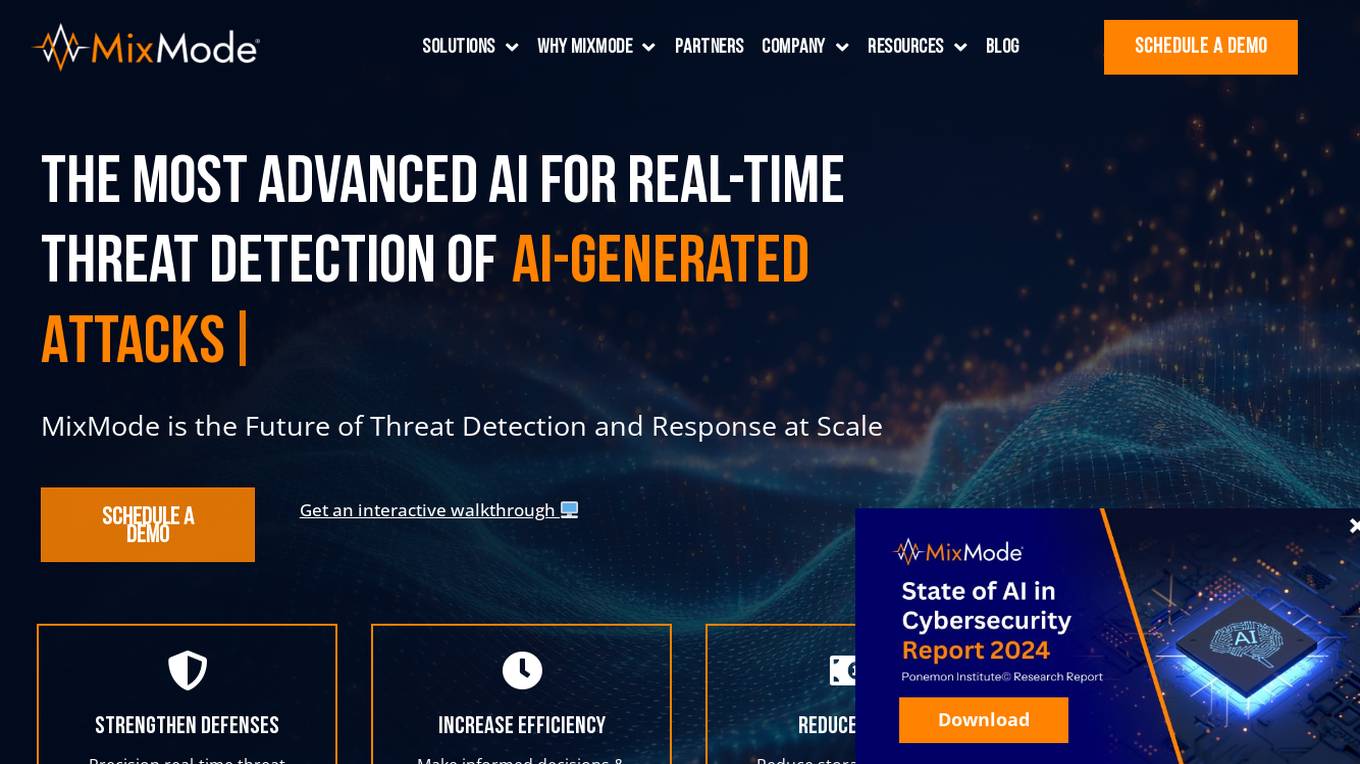
MixMode
MixMode is the world's most advanced AI for threat detection, offering a dynamic threat detection platform that utilizes patented Third Wave AI technology. It provides real-time detection of known and novel attacks with high precision, self-supervised learning capabilities, and context-awareness to defend against modern threats. MixMode empowers modern enterprises with unprecedented speed and scale in threat detection, delivering unrivaled capabilities without the need for predefined rules or human input. The platform is trusted by top security teams and offers rapid deployment, customization to individual network dynamics, and state-of-the-art AI-driven threat detection.
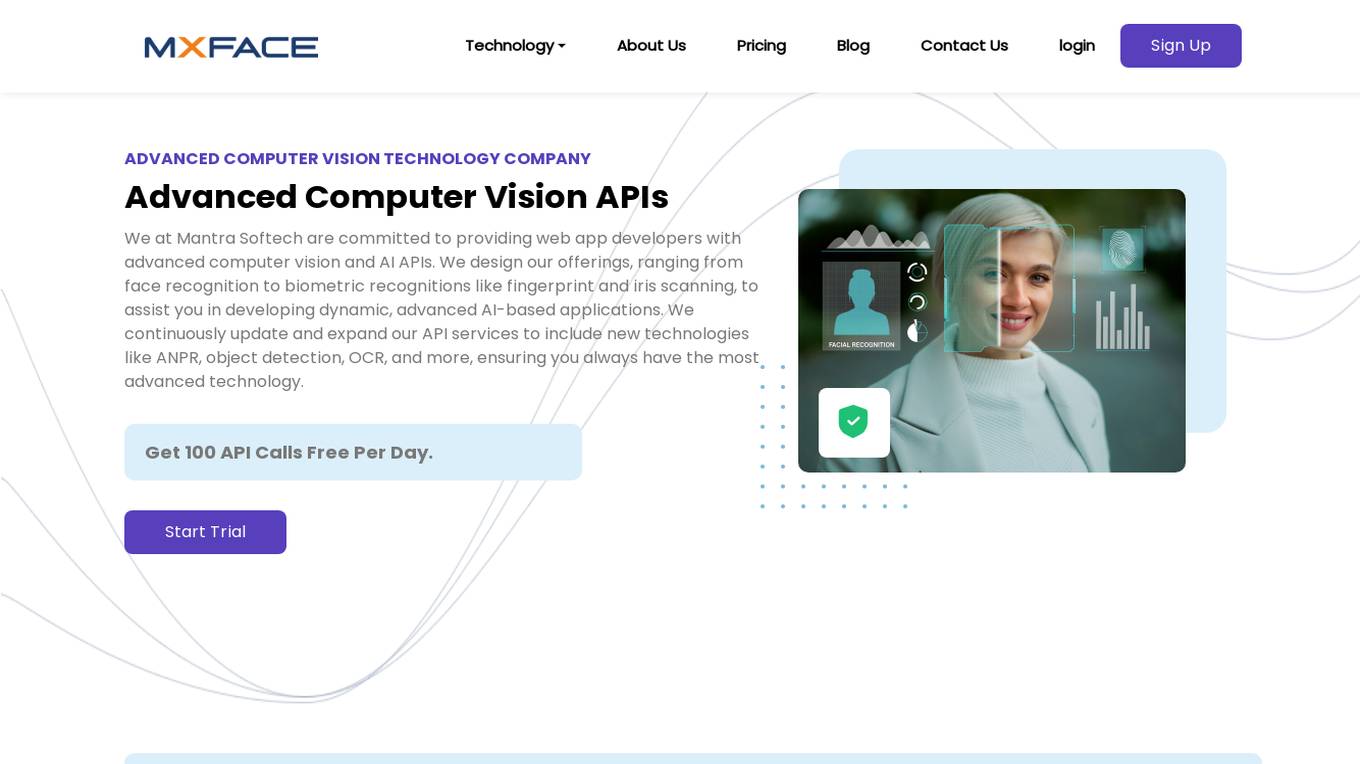
Mxface
Mxface is a leading face recognition API technology that offers advanced computer vision and AI APIs for developers. The platform provides services like face detection, face comparing, face landmarks, face attributes, face search, iris recognition, fingerprint recognition, and people detection. Mxface ensures data security, real-time face recognition, precision, easy face enrollment, and device integration. It is a cloud-based facial recognition solution that supports various use cases and offers comprehensive security features.
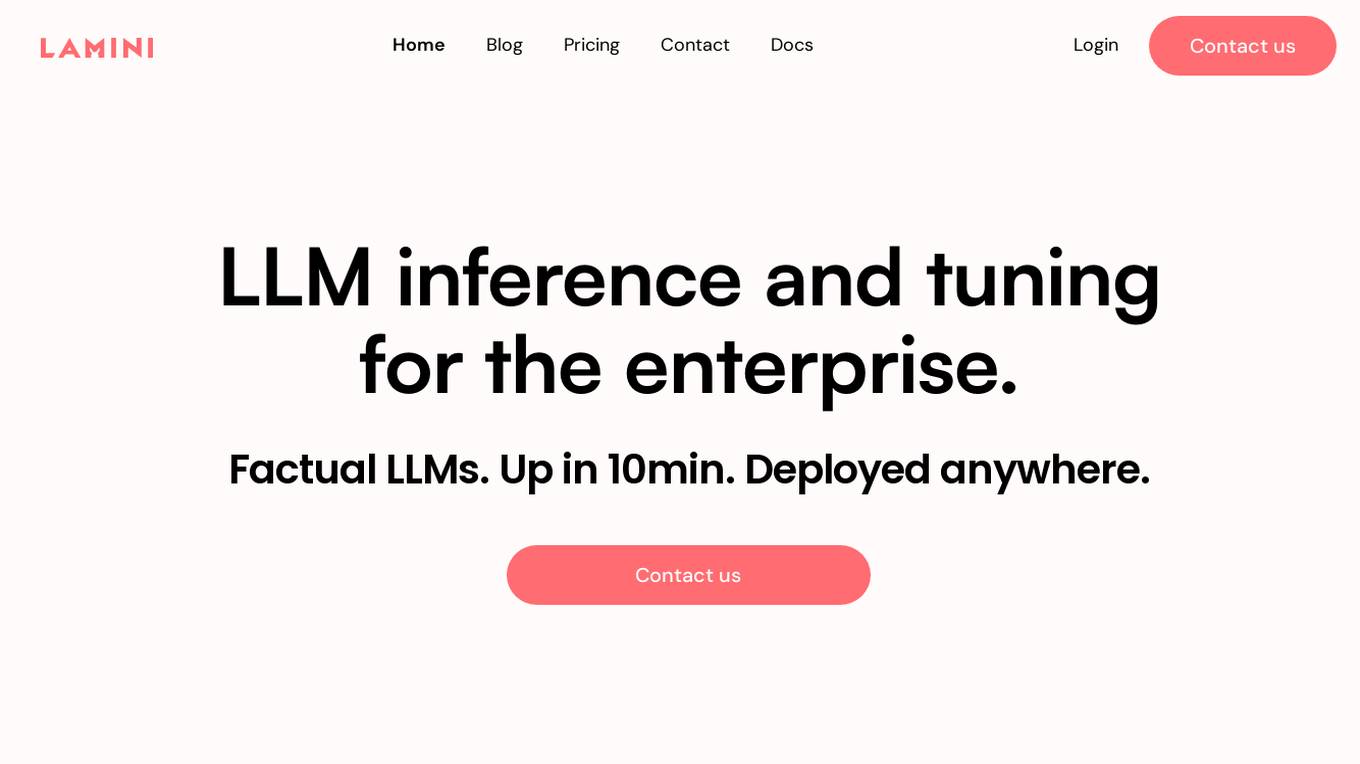
Lamini
Lamini is an enterprise-level LLM platform that offers precise recall with Memory Tuning, enabling teams to achieve over 95% accuracy even with large amounts of specific data. It guarantees JSON output and delivers massive throughput for inference. Lamini is designed to be deployed anywhere, including air-gapped environments, and supports training and inference on Nvidia or AMD GPUs. The platform is known for its factual LLMs and reengineered decoder that ensures 100% schema accuracy in the JSON output.
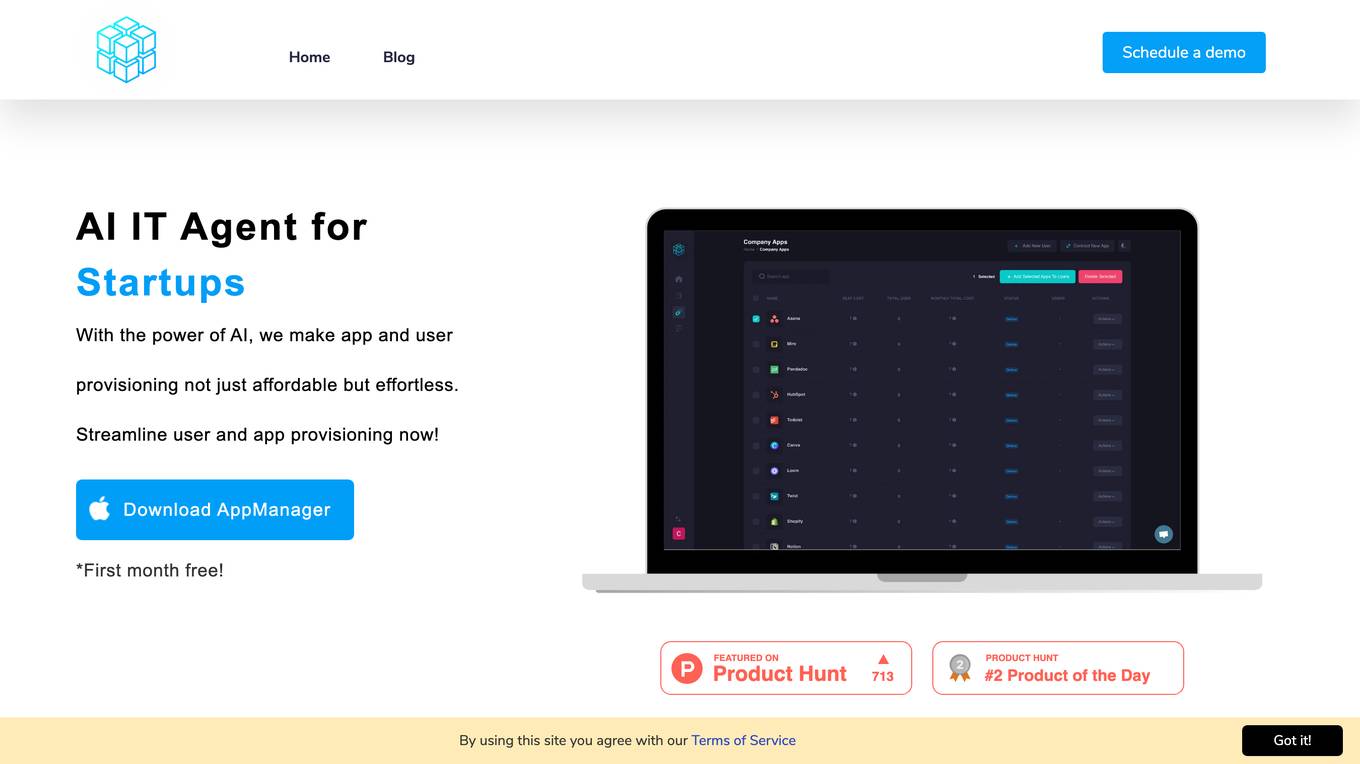
AppManager
AppManager is an AI IT Agent designed for startups to streamline app and user provisioning processes. With the power of AI, AppManager makes managing app subscriptions, user permissions, and payment methods effortless and cost-effective. It helps startups focus on growth by providing clear visibility into app subscription costs, smart spending insights, and enhanced license cost tracking. AppManager simplifies user management, subscription management, permissions management, and payment method updates, all in one centralized platform.
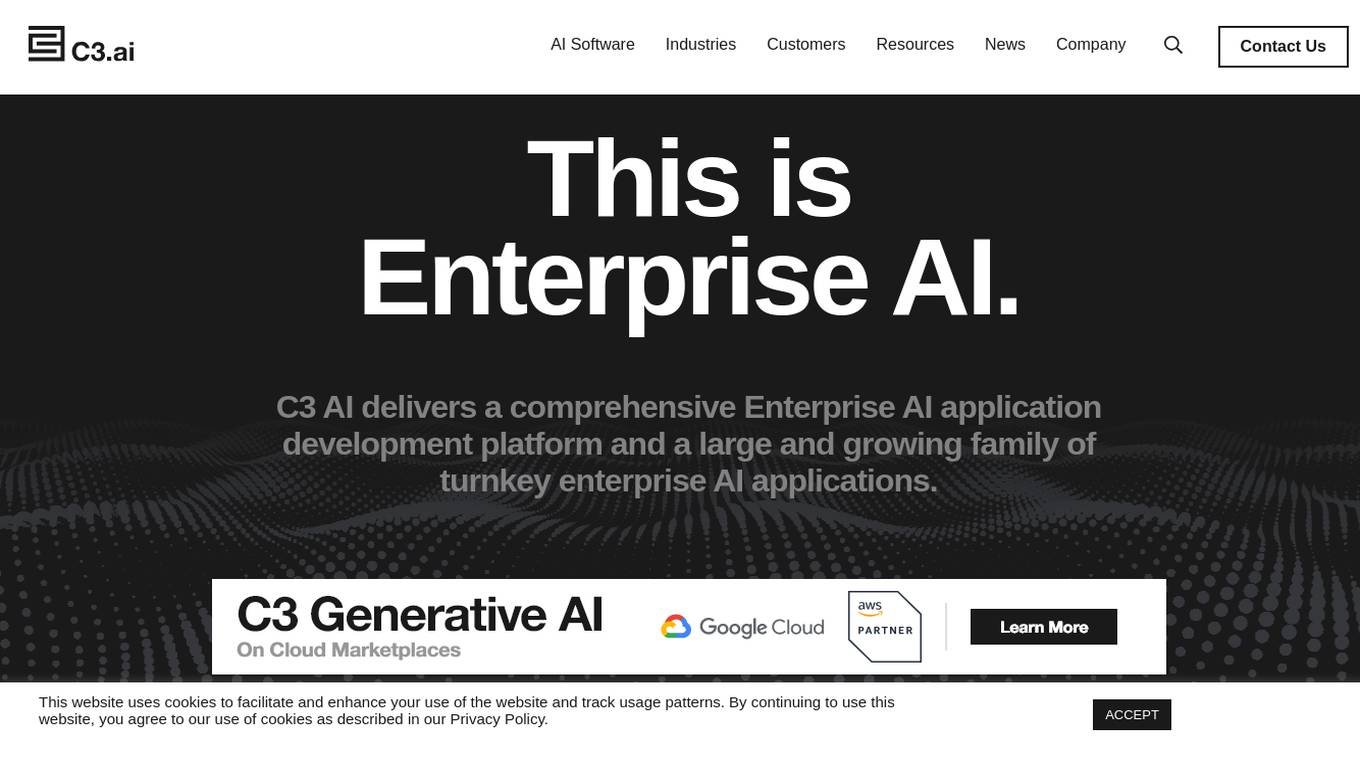
C3 AI
C3 AI provides a comprehensive Enterprise AI application development platform and a large and growing family of turnkey enterprise AI applications. C3 AI's platform provides all necessary software services in one integrated suite to rapidly develop, provision, and operate Enterprise AI applications. C3 AI's applications are designed to meet the business-critical needs of global enterprises in various industries, including manufacturing, financial services, government, utilities, oil and gas, chemicals, agribusiness, defense and intelligence.
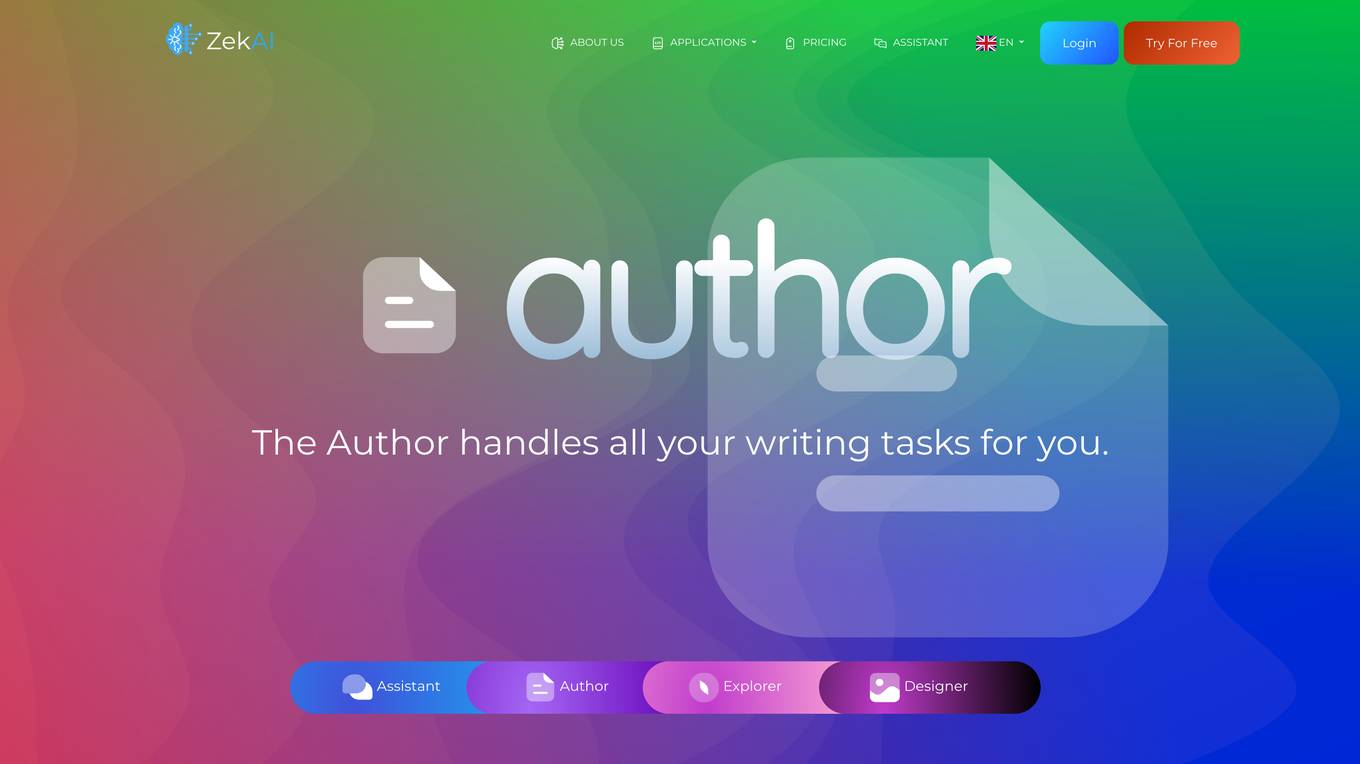
ZekAI
ZekAI is an artificial intelligence platform that provides a suite of tools to help users with a variety of tasks, including writing, designing, exploring documents, and more. The platform is powered by state-of-the-art AI models, including GPT-4, GPT-3.5, and custom models, which enable it to deliver high-quality results and ensure the provision of safe content at all times.
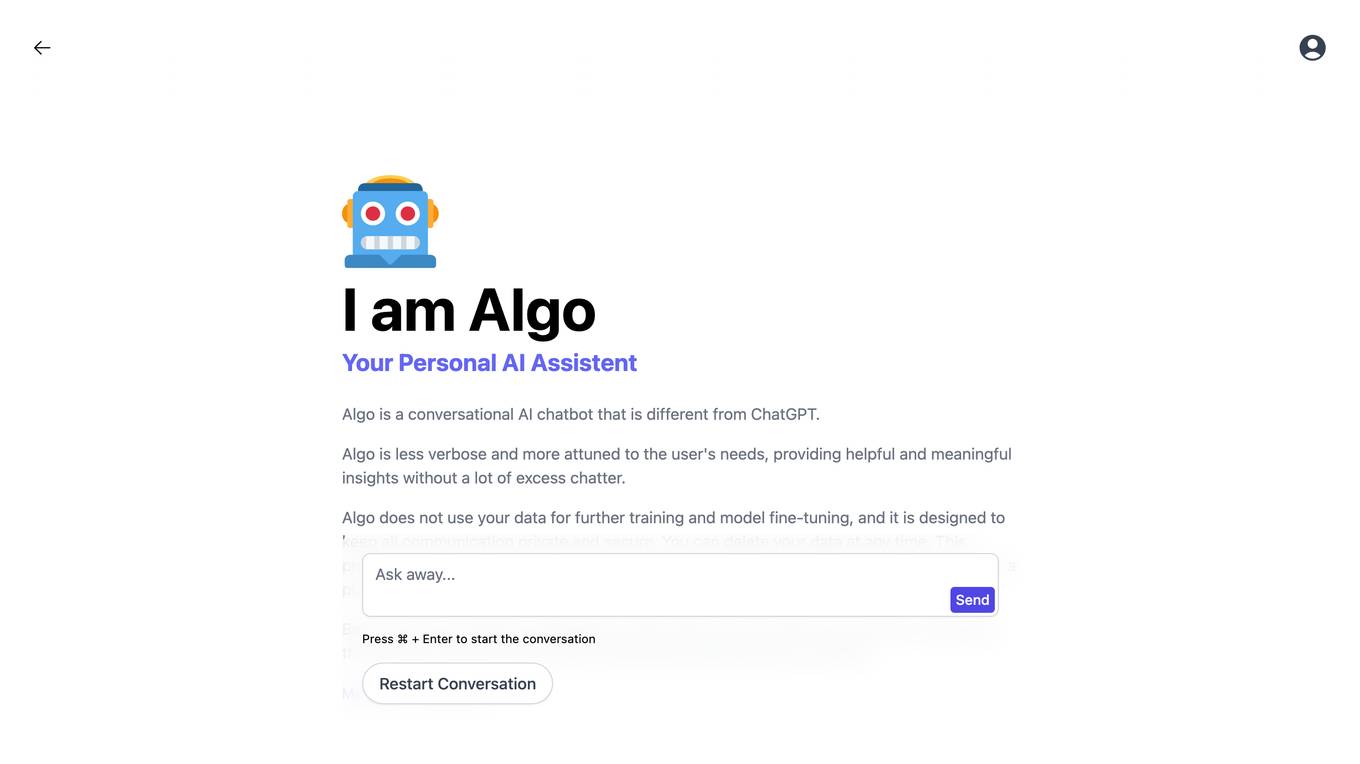
Algo
Algo is a conversational AI chatbot that is different from ChatGPT. Algo is less verbose and more attuned to the user's needs, providing helpful and meaningful insights without a lot of excess chatter. Algo does not use your data for further training and model fine-tuning, and it is designed to keep all communication private and secure. You can delete your data at any time. This provides a higher level of control over personal information compared to ChatGPT, which is a public system and has no provision for data deletion. Beyond its conversational capabilities, Algo boasts built-in features that allow it to browse the web and craft stunning visuals using advanced generative AI models.
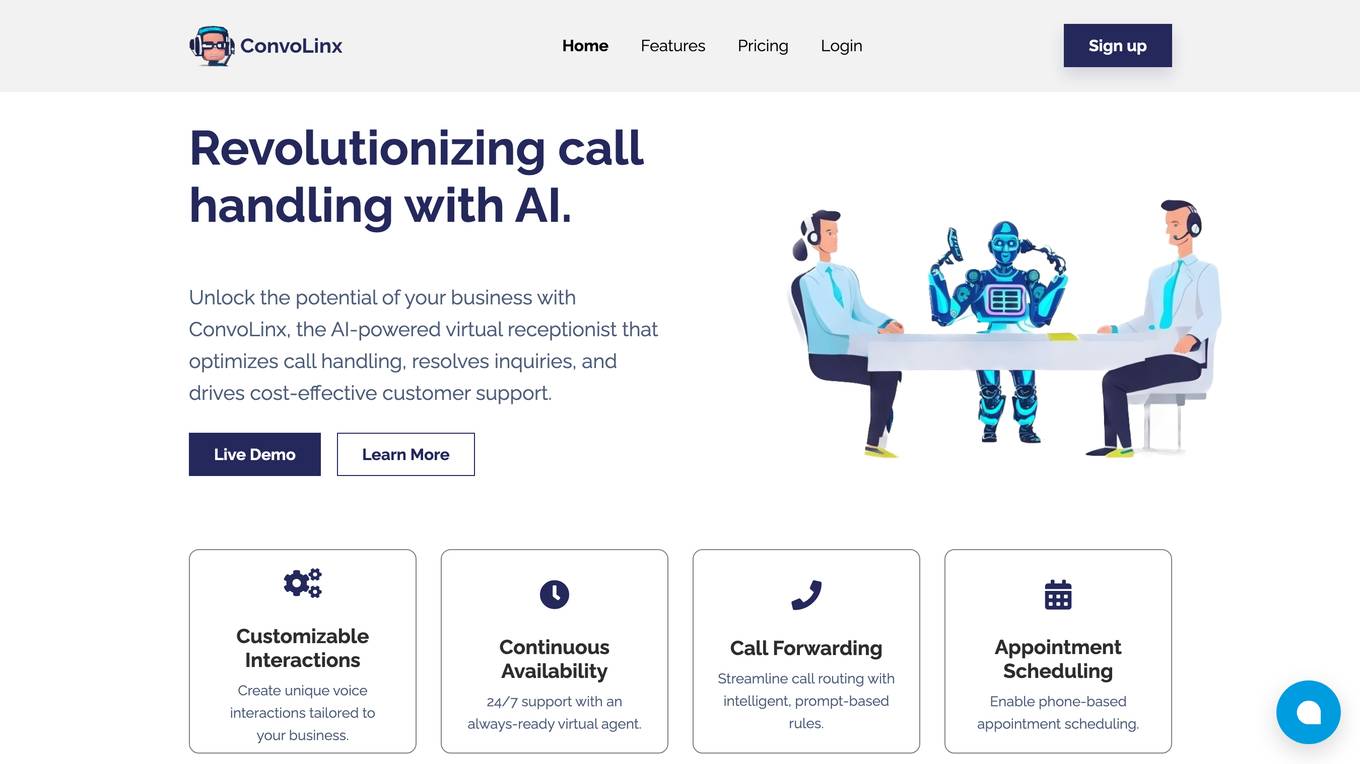
ConvoLinx
ConvoLinx is an AI-powered virtual receptionist that optimizes call handling, resolves inquiries, and drives cost-effective customer support. It offers features such as customizable interactions, continuous availability, call forwarding, appointment scheduling, and custom call flows. ConvoLinx seamlessly integrates into business processes, allowing for the collection of specific customer information and the provision of tailored solutions. Its unique customer call flows can be customized for any interaction, creating personalized call handlers to improve customer experience and drive satisfaction.
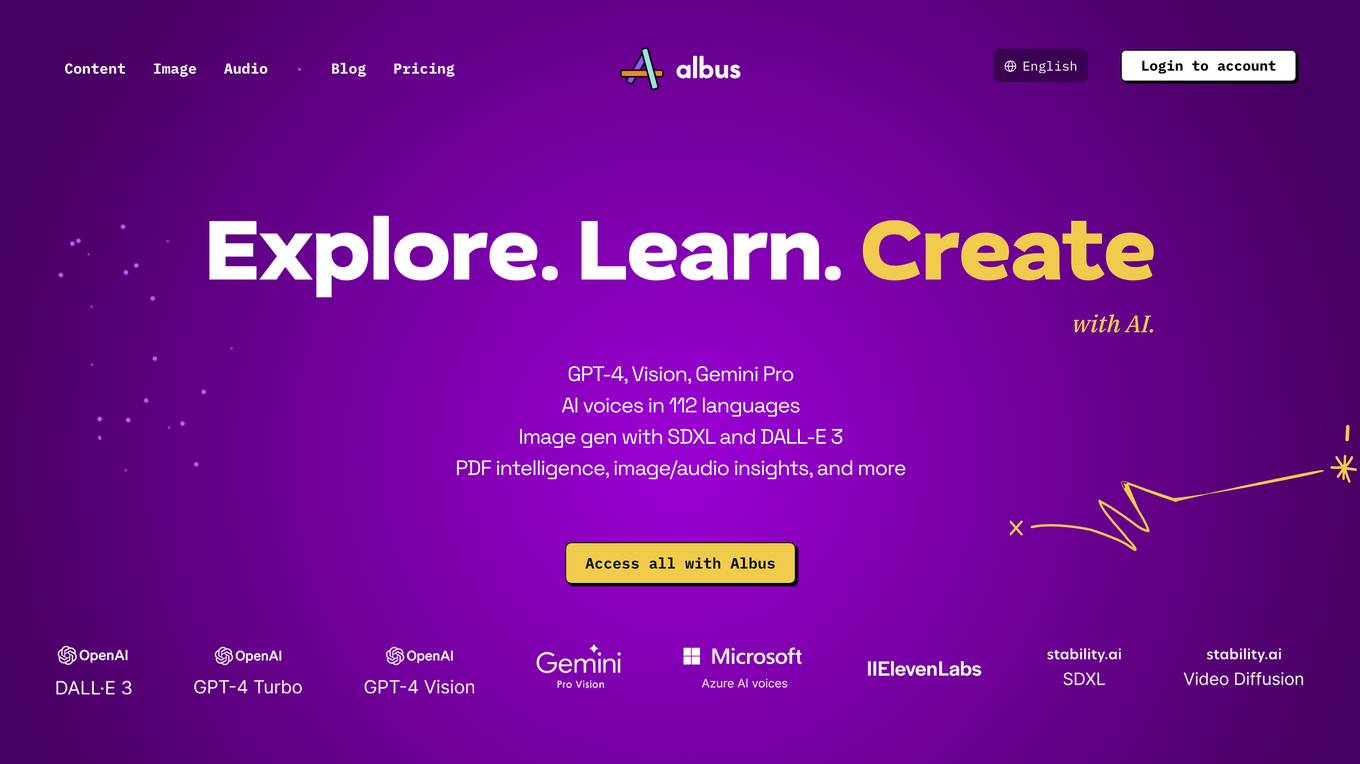
Albus
Albus is an AI-powered platform that provides a range of tools for exploring, learning, and creating with AI. These tools include access to GPT-4, Vision, Gemini Pro AI voices in 112 languages, image generation with SDXL and DALL-E 3, PDF intelligence, image/audio insights, and more. Albus is designed to help users break down complex topics, jumpstart their research, expand ideas in context, and develop their train of thought. It also offers a variety of creative tools, such as the ability to turn text into mesmerizing visuals, generate images from scratch, and create audio narrations from images.

Diligen
Diligen is a machine learning powered contract analysis tool that helps teams streamline their contract review process. It can identify key provisions, generate contract summaries, and help teams manage review with machine learning powered analysis. Diligen is used by law firms, legal service providers, and corporations around the world to make high quality contract review faster, more efficient, and more cost effective.
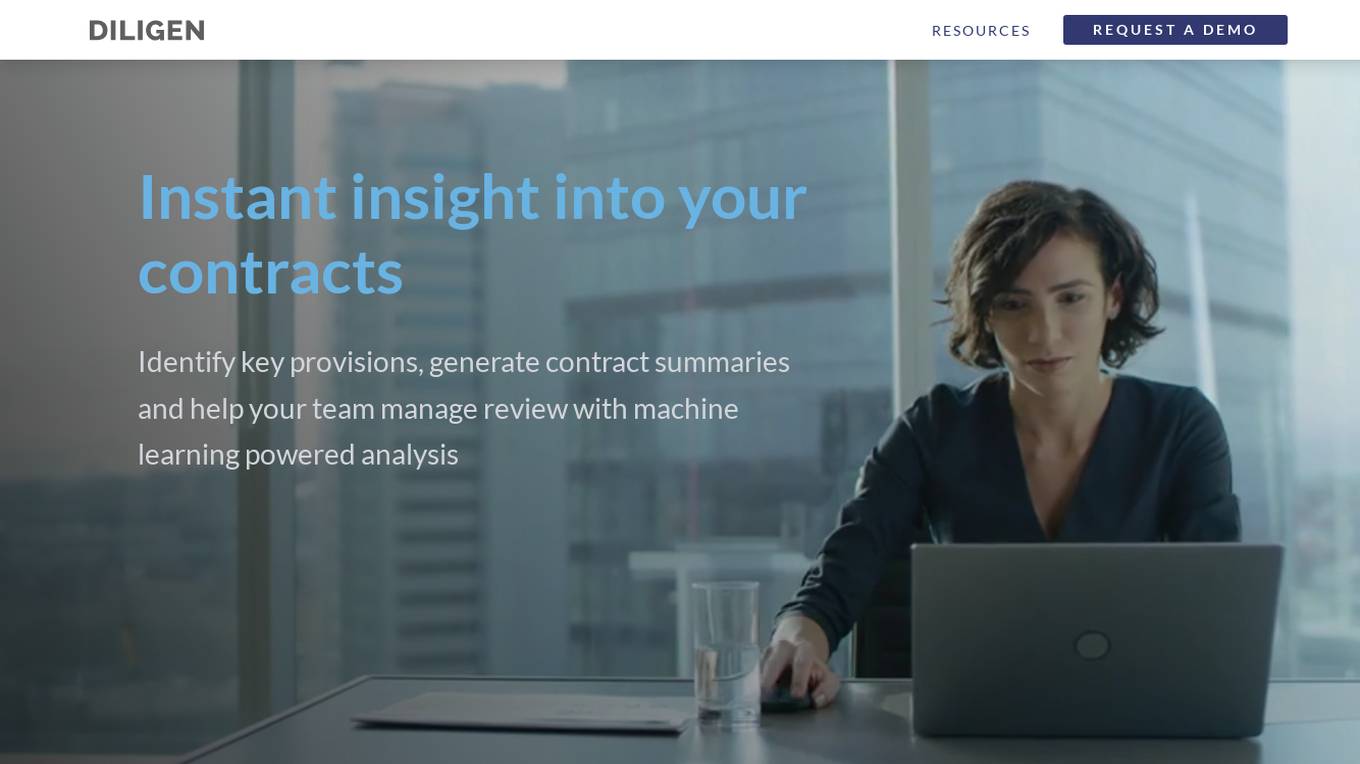
Diligen
Diligen is a machine learning powered contract analysis tool that provides instant insight into contracts by identifying key provisions, generating summaries, and facilitating team collaboration. It is designed to streamline contract review processes for law firms, legal service providers, and corporations, enabling faster and higher quality review while managing projects at scale. Diligen is used globally by various organizations to make contract review more efficient and cost-effective.

LeaseLens
LeaseLens is a free AI-based lease abstraction software that simplifies the process of extracting relevant data points from real estate or commercial lease documents. It uses machine learning technology to provide accurate lease abstracts in minutes, saving time and cost compared to manual abstraction services. Users can customize the information extracted and export results to Excel or Word for a small fee. The platform ensures data privacy by not sharing information with third parties and deleting leases after abstraction.
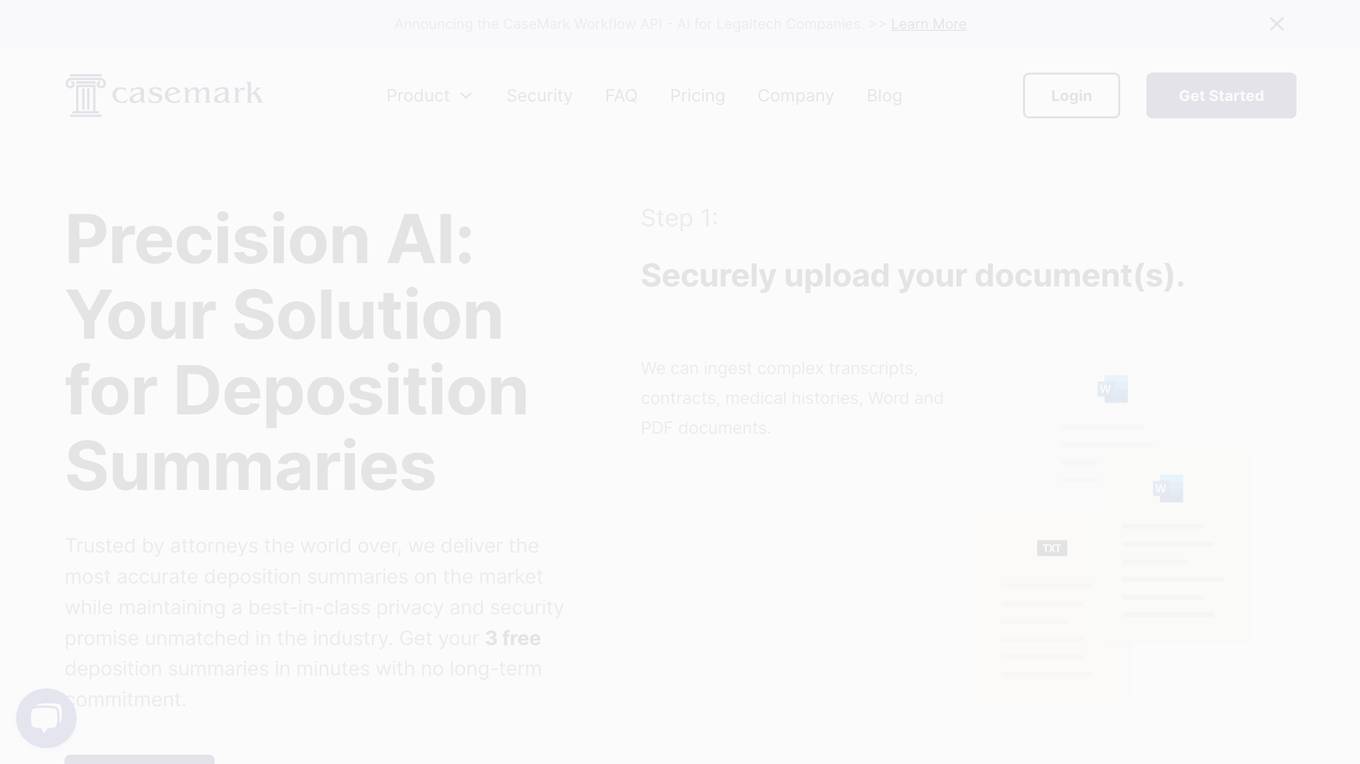
CaseMark
CaseMark is an AI application that offers AI-enabled workflows for the legal profession. It provides services such as deposition summaries, trial and hearing summaries, document and contract review, discovery response workflow, and more. CaseMark uses AI technology to assist legal professionals in summarizing and analyzing legal documents efficiently and accurately, while prioritizing privacy and security.
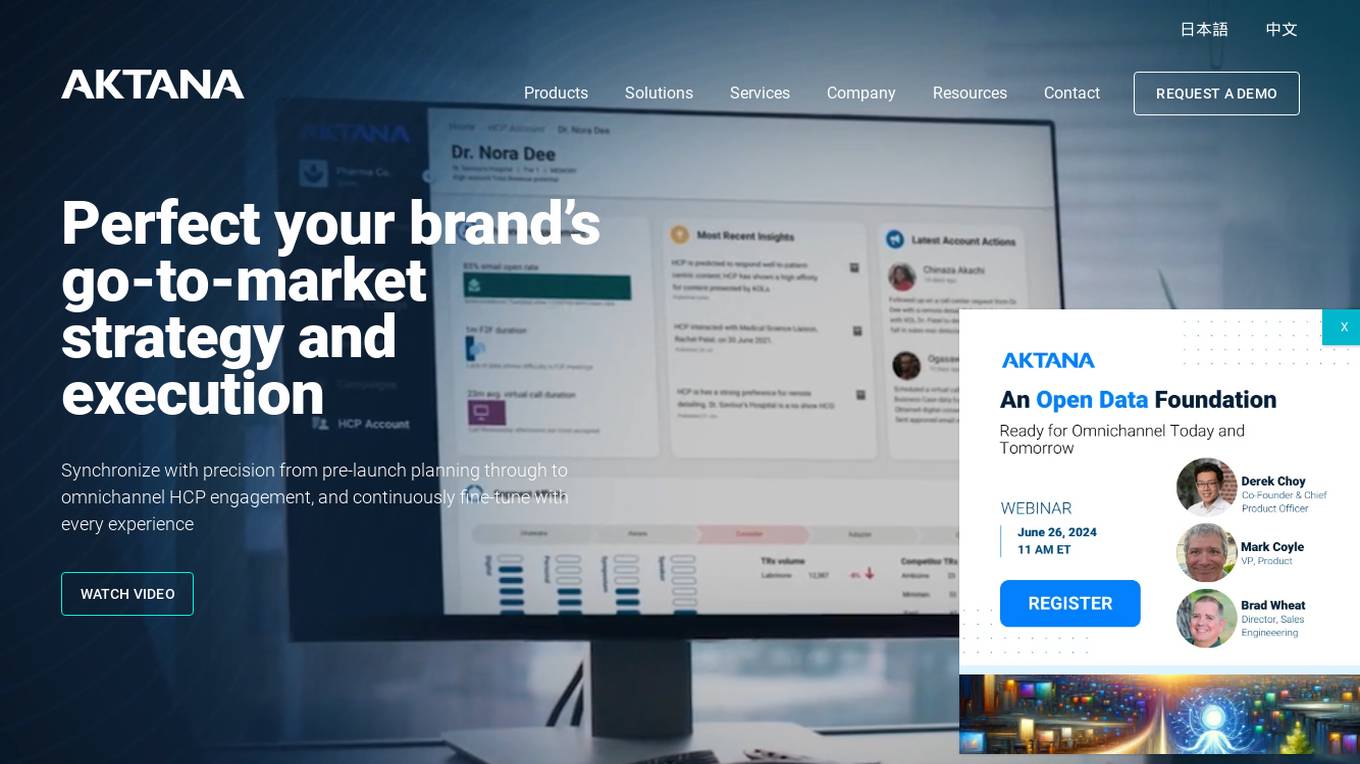
Aktana
Aktana is an AI and mobile intelligence platform designed for the pharmaceutical and life sciences industry. It offers a suite of products and solutions to help companies develop, plan, and execute go-to-market strategies with precision. Aktana's AI-powered tools enable real-time synchronization and refinement of strategies, leading to increased operational efficiency and sales lift for biopharma leaders. The platform provides immediate feedback from the field, reducing costs and increasing revenues for global pharmaceutical companies.
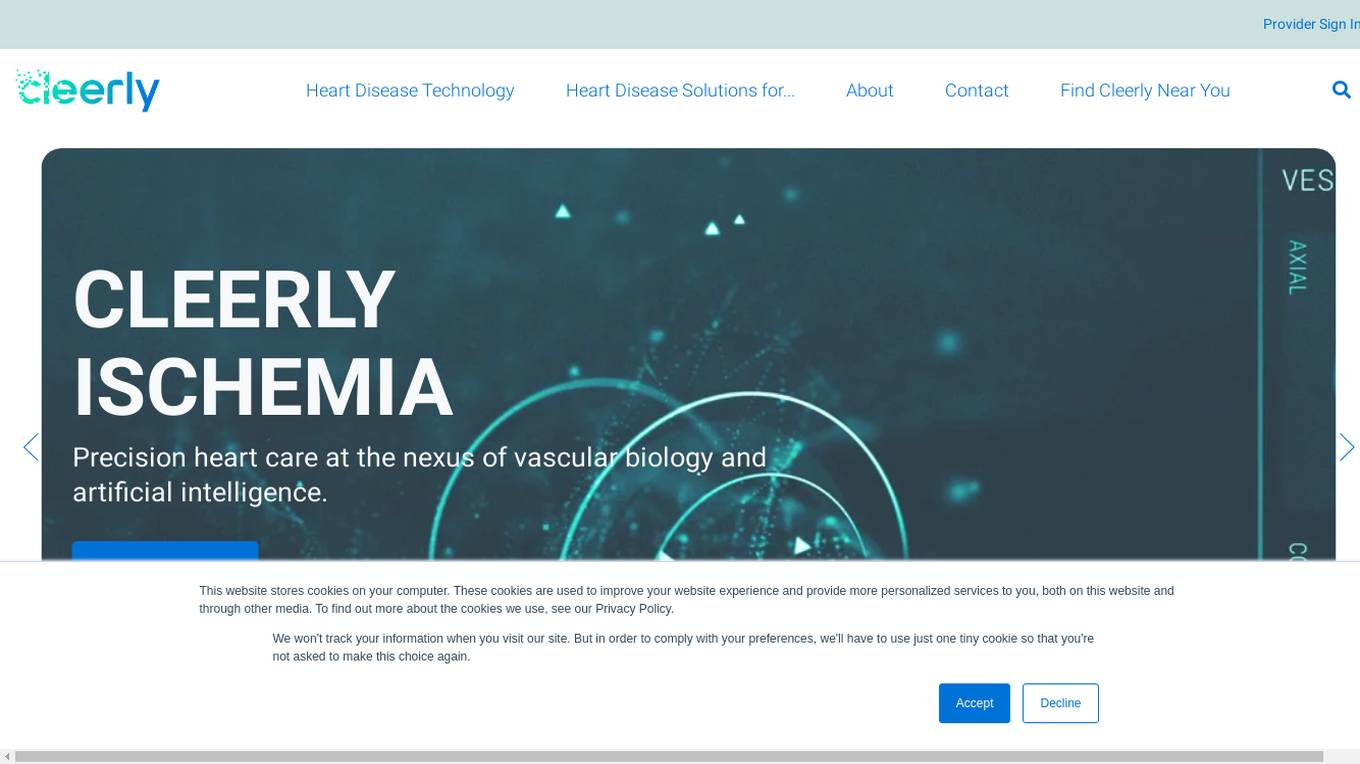
Cleerly
Cleerly is a digital healthcare company transforming the way clinicians approach the treatment of heart disease. Our clinically-proven, AI-based digital care platform works with coronary computed tomography angiography (CCTA) imaging to help clinicians precisely identify and define atherosclerosis earlier, so they can provide personalized, life-saving treatment plans for all patients throughout their care continuum. We measure atherosclerosis - plaque build-up in the heart's arteries - not indirect markers such as risk factors and symptoms of disease. Our AI-enabled digital care pathway offers simpler, faster, more accurate heart disease evaluation and reporting that's tailored to each stakeholder, improving overall clinical and financial outcomes.
Beacon Biosignals
Beacon Biosignals provides an EEG neurobiomarker platform that is designed to accelerate clinical trials and enable new treatments for patients with neurological and psychiatric diseases. Their platform is powered by machine learning and a world-class clinico-EEG database, which allows them to analyze existing EEG data for insights into mechanisms, PK/PD, and patient stratification. This information can be used to guide further development efforts, optimize clinical trials, and enhance understanding of treatment efficacy.
20 - Open Source AI Tools

pluto
Pluto is a development tool dedicated to helping developers **build cloud and AI applications more conveniently** , resolving issues such as the challenging deployment of AI applications and open-source models. Developers are able to write applications in familiar programming languages like **Python and TypeScript** , **directly defining and utilizing the cloud resources necessary for the application within their code base** , such as AWS SageMaker, DynamoDB, and more. Pluto automatically deduces the infrastructure resource needs of the app through **static program analysis** and proceeds to create these resources on the specified cloud platform, **simplifying the resources creation and application deployment process**.

free-for-life
A massive list including a huge amount of products and services that are completely free! ⭐ Star on GitHub • 🤝 Contribute # Table of Contents * APIs, Data & ML * Artificial Intelligence * BaaS * Code Editors * Code Generation * DNS * Databases * Design & UI * Domains * Email * Font * For Students * Forms * Linux Distributions * Messaging & Streaming * PaaS * Payments & Billing * SSL
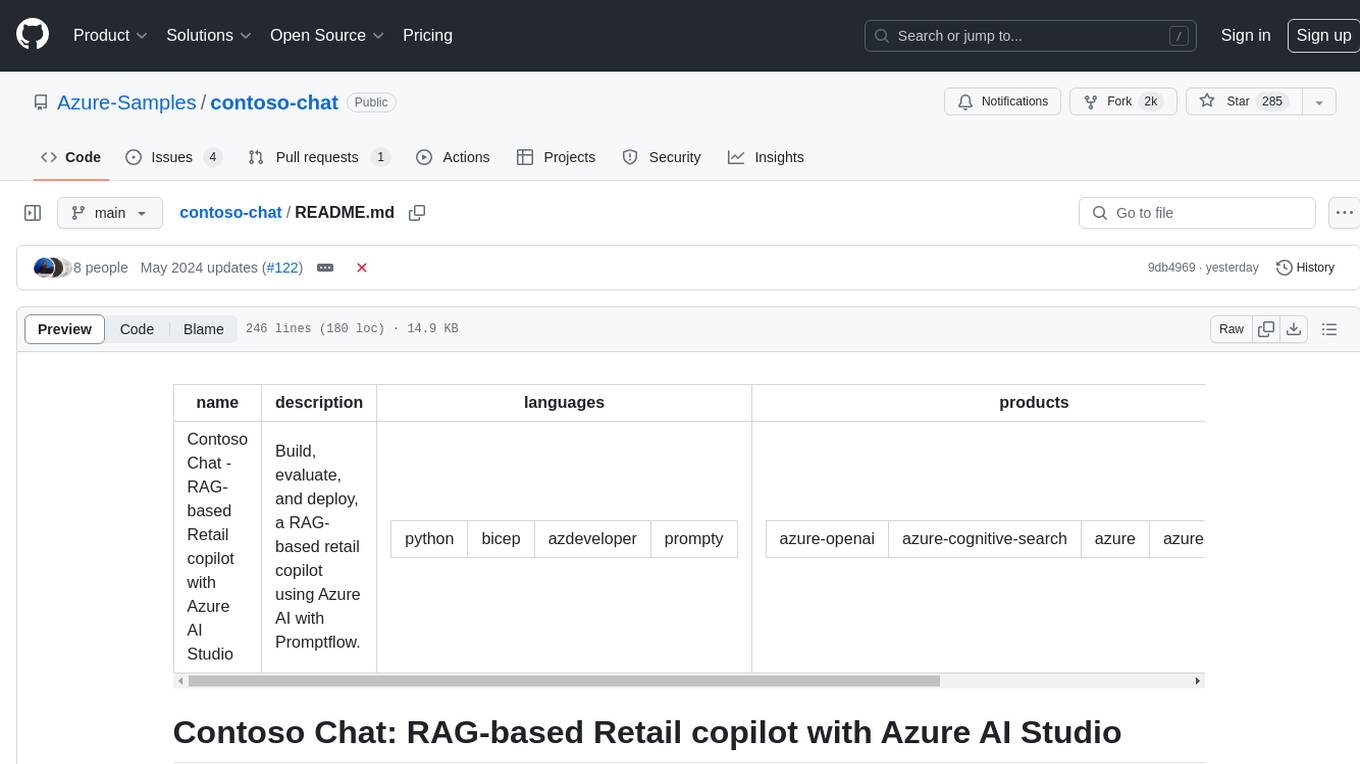
contoso-chat
Contoso Chat is a Python sample demonstrating how to build, evaluate, and deploy a retail copilot application with Azure AI Studio using Promptflow with Prompty assets. The sample implements a Retrieval Augmented Generation approach to answer customer queries based on the company's product catalog and customer purchase history. It utilizes Azure AI Search, Azure Cosmos DB, Azure OpenAI, text-embeddings-ada-002, and GPT models for vectorizing user queries, AI-assisted evaluation, and generating chat responses. By exploring this sample, users can learn to build a retail copilot application, define prompts using Prompty, design, run & evaluate a copilot using Promptflow, provision and deploy the solution to Azure using the Azure Developer CLI, and understand Responsible AI practices for evaluation and content safety.

rag-experiment-accelerator
The RAG Experiment Accelerator is a versatile tool that helps you conduct experiments and evaluations using Azure AI Search and RAG pattern. It offers a rich set of features, including experiment setup, integration with Azure AI Search, Azure Machine Learning, MLFlow, and Azure OpenAI, multiple document chunking strategies, query generation, multiple search types, sub-querying, re-ranking, metrics and evaluation, report generation, and multi-lingual support. The tool is designed to make it easier and faster to run experiments and evaluations of search queries and quality of response from OpenAI, and is useful for researchers, data scientists, and developers who want to test the performance of different search and OpenAI related hyperparameters, compare the effectiveness of various search strategies, fine-tune and optimize parameters, find the best combination of hyperparameters, and generate detailed reports and visualizations from experiment results.
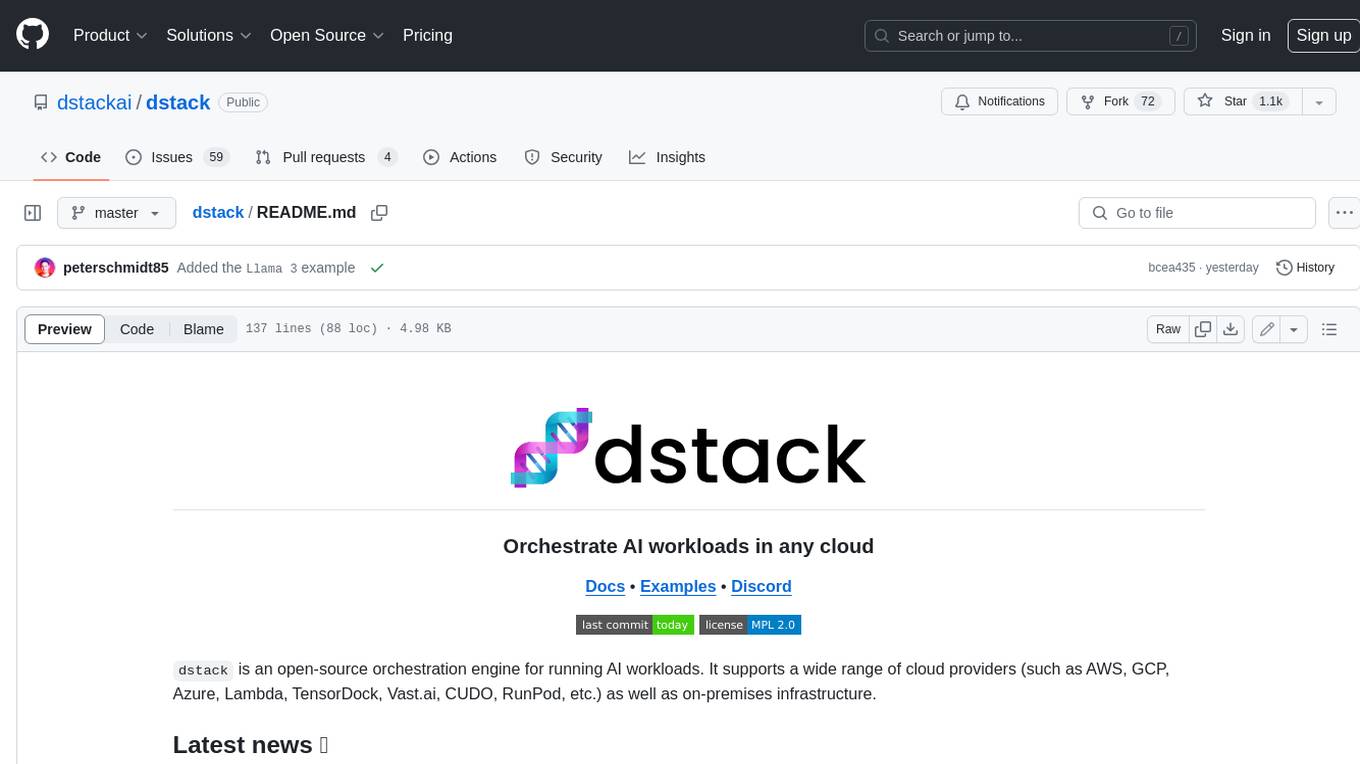
dstack
Dstack is an open-source orchestration engine for running AI workloads in any cloud. It supports a wide range of cloud providers (such as AWS, GCP, Azure, Lambda, TensorDock, Vast.ai, CUDO, RunPod, etc.) as well as on-premises infrastructure. With Dstack, you can easily set up and manage dev environments, tasks, services, and pools for your AI workloads.
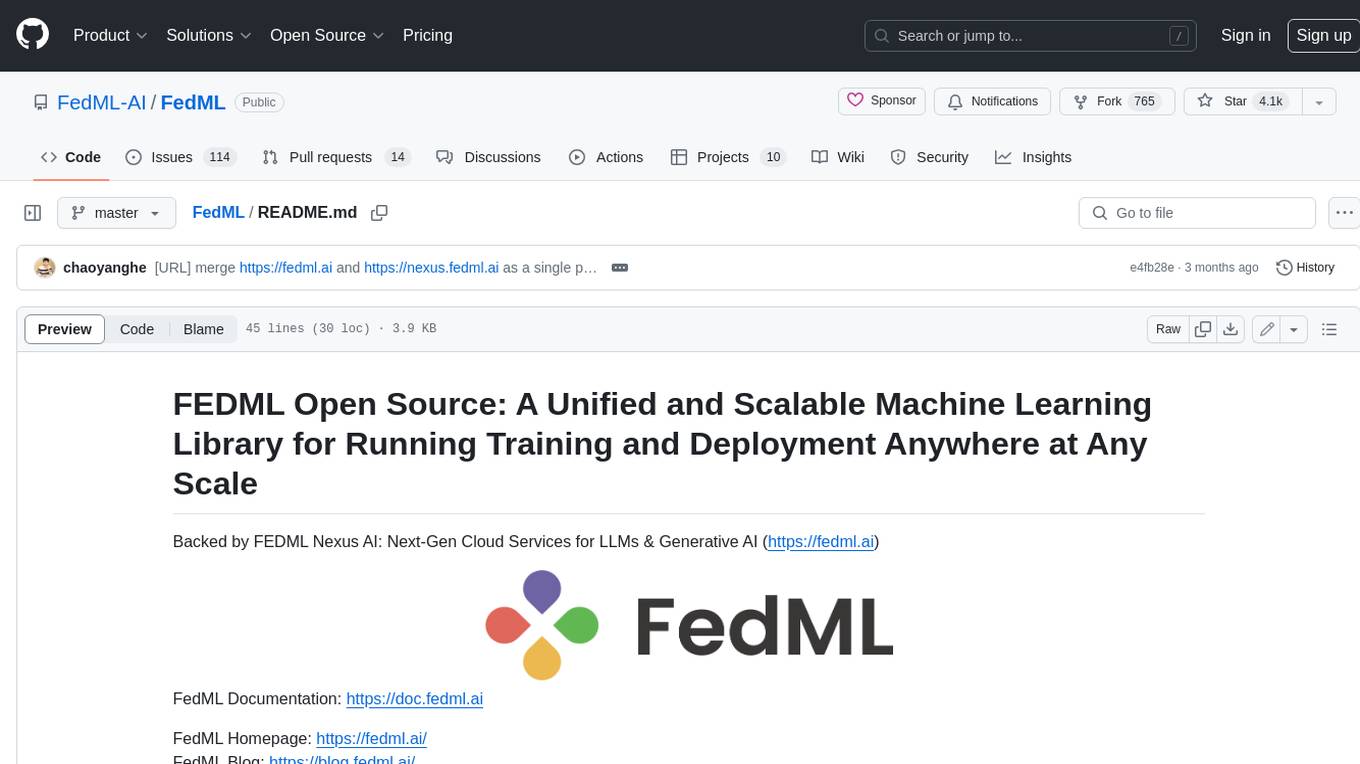
FedML
FedML is a unified and scalable machine learning library for running training and deployment anywhere at any scale. It is highly integrated with FEDML Nexus AI, a next-gen cloud service for LLMs & Generative AI. FEDML Nexus AI provides holistic support of three interconnected AI infrastructure layers: user-friendly MLOps, a well-managed scheduler, and high-performance ML libraries for running any AI jobs across GPU Clouds.
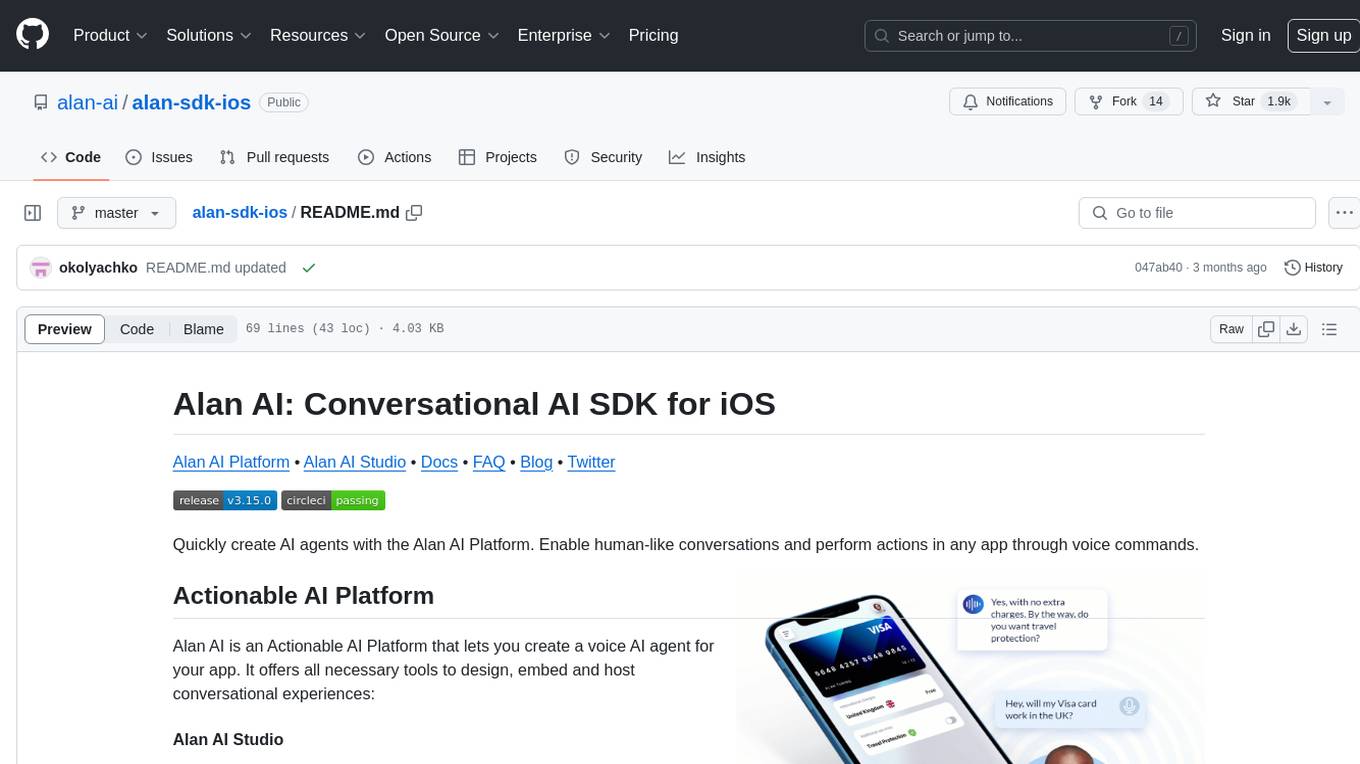
alan-sdk-ios
Alan AI SDK for iOS is a powerful tool that allows developers to quickly create AI agents for their iOS apps. With Alan AI Platform, users can easily design, embed, and host conversational experiences in their applications. The platform offers a web-based IDE called Alan AI Studio for creating dialog scenarios, lightweight SDKs for embedding AI agents, and a backend powered by top-notch speech recognition and natural language understanding technologies. Alan AI enables human-like conversations and actions through voice commands, with features like on-the-fly updates, dialog flow testing, and analytics.

AiTreasureBox
AiTreasureBox is a versatile AI tool that provides a collection of pre-trained models and algorithms for various machine learning tasks. It simplifies the process of implementing AI solutions by offering ready-to-use components that can be easily integrated into projects. With AiTreasureBox, users can quickly prototype and deploy AI applications without the need for extensive knowledge in machine learning or deep learning. The tool covers a wide range of tasks such as image classification, text generation, sentiment analysis, object detection, and more. It is designed to be user-friendly and accessible to both beginners and experienced developers, making AI development more efficient and accessible to a wider audience.
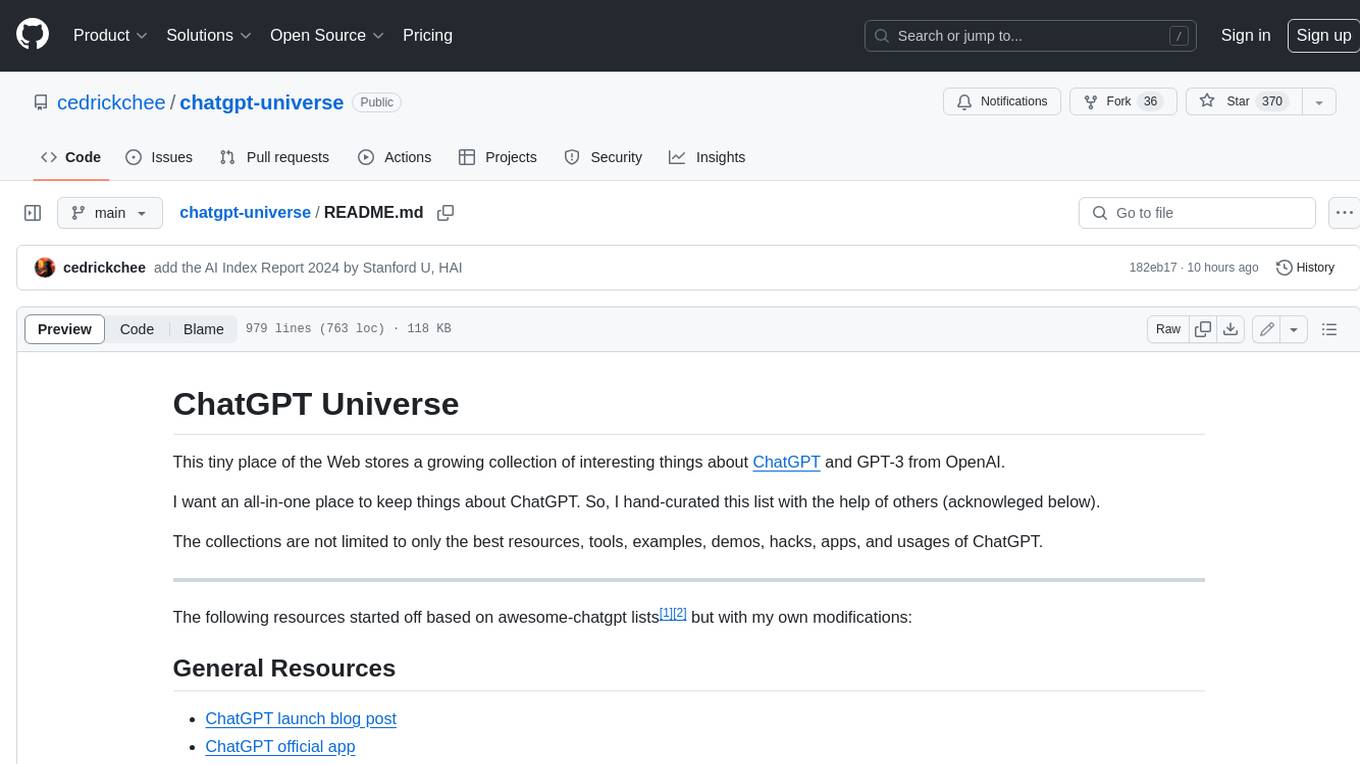
chatgpt-universe
ChatGPT is a large language model that can generate human-like text, translate languages, write different kinds of creative content, and answer your questions in a conversational way. It is trained on a massive amount of text data, and it is able to understand and respond to a wide range of natural language prompts. Here are 5 jobs suitable for this tool, in lowercase letters: 1. content writer 2. chatbot assistant 3. language translator 4. creative writer 5. researcher
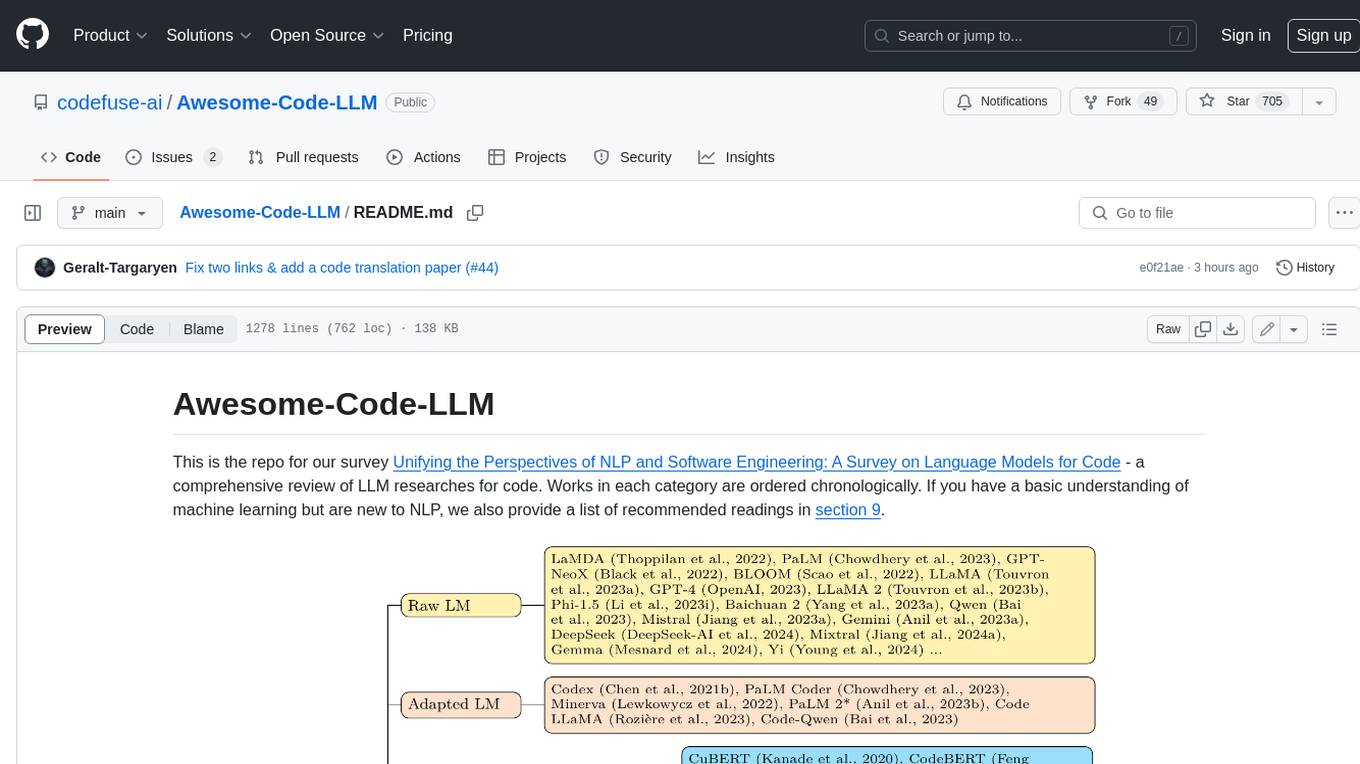
Awesome-Code-LLM
Analyze the following text from a github repository (name and readme text at end) . Then, generate a JSON object with the following keys and provide the corresponding information for each key, in lowercase letters: 'description' (detailed description of the repo, must be less than 400 words,Ensure that no line breaks and quotation marks.),'for_jobs' (List 5 jobs suitable for this tool,in lowercase letters), 'ai_keywords' (keywords of the tool,user may use those keyword to find the tool,in lowercase letters), 'for_tasks' (list of 5 specific tasks user can use this tool to do,in lowercase letters), 'answer' (in english languages)
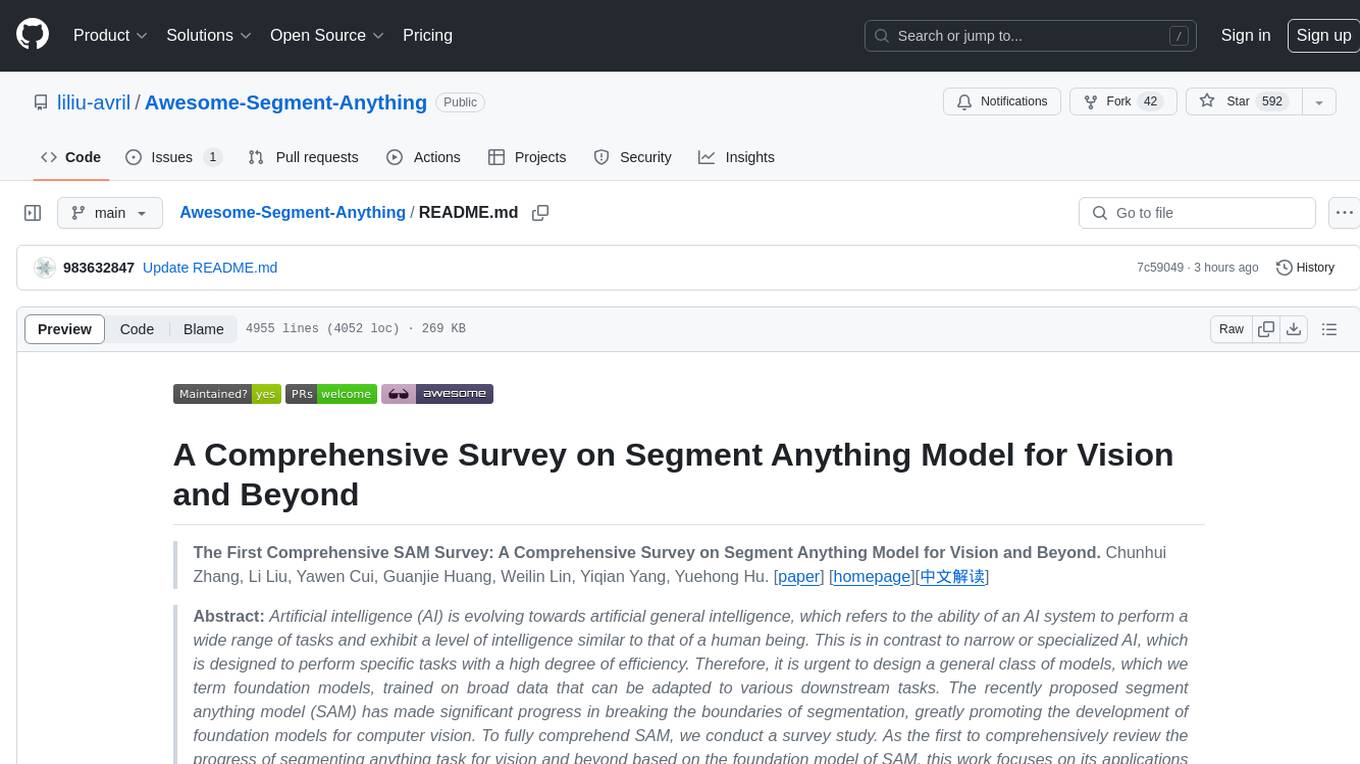
Awesome-Segment-Anything
Awesome-Segment-Anything is a powerful tool for segmenting and extracting information from various types of data. It provides a user-friendly interface to easily define segmentation rules and apply them to text, images, and other data formats. The tool supports both supervised and unsupervised segmentation methods, allowing users to customize the segmentation process based on their specific needs. With its versatile functionality and intuitive design, Awesome-Segment-Anything is ideal for data analysts, researchers, content creators, and anyone looking to efficiently extract valuable insights from complex datasets.
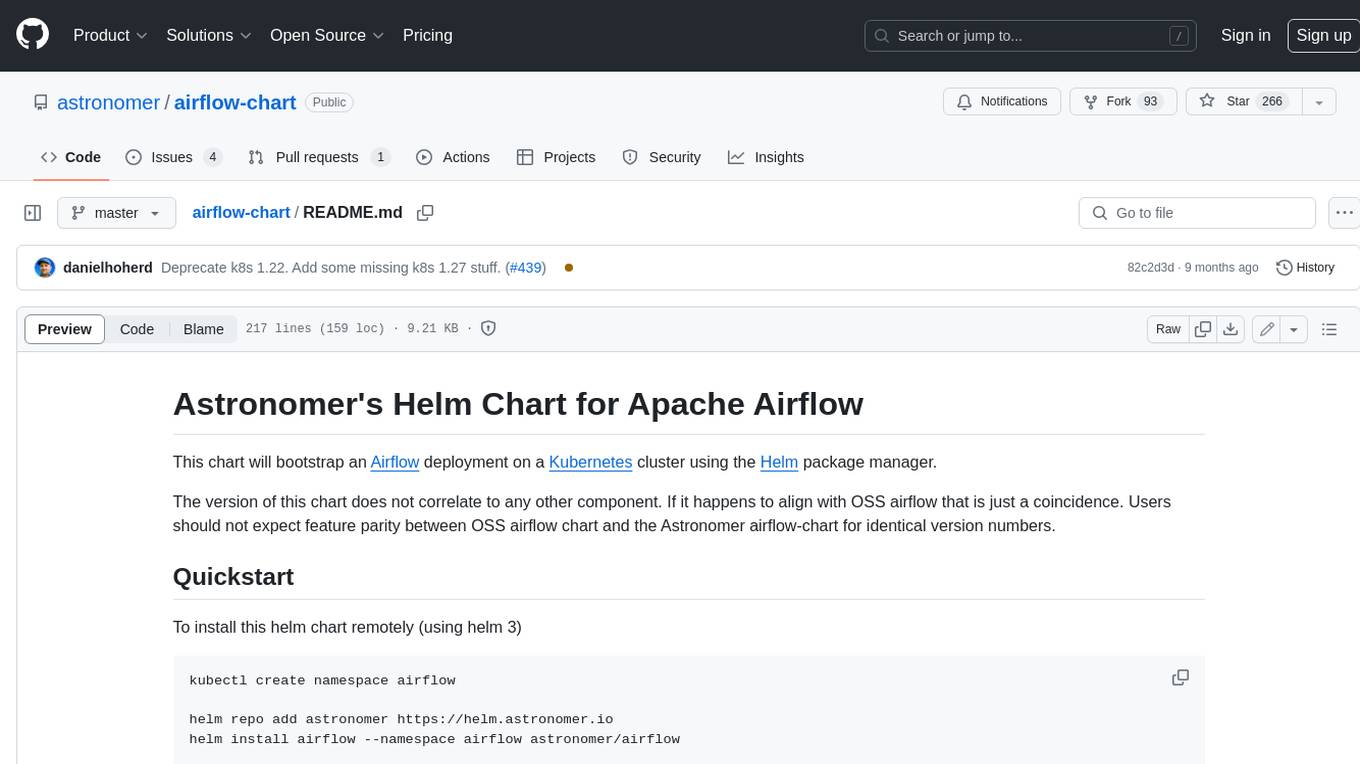
airflow-chart
This Helm chart bootstraps an Airflow deployment on a Kubernetes cluster using the Helm package manager. The version of this chart does not correlate to any other component. Users should not expect feature parity between OSS airflow chart and the Astronomer airflow-chart for identical version numbers. To install this helm chart remotely (using helm 3) kubectl create namespace airflow helm repo add astronomer https://helm.astronomer.io helm install airflow --namespace airflow astronomer/airflow To install this repository from source sh kubectl create namespace airflow helm install --namespace airflow . Prerequisites: Kubernetes 1.12+ Helm 3.6+ PV provisioner support in the underlying infrastructure Installing the Chart: sh helm install --name my-release . The command deploys Airflow on the Kubernetes cluster in the default configuration. The Parameters section lists the parameters that can be configured during installation. Upgrading the Chart: First, look at the updating documentation to identify any backwards-incompatible changes. To upgrade the chart with the release name `my-release`: sh helm upgrade --name my-release . Uninstalling the Chart: To uninstall/delete the `my-release` deployment: sh helm delete my-release The command removes all the Kubernetes components associated with the chart and deletes the release. Updating DAGs: Bake DAGs in Docker image The recommended way to update your DAGs with this chart is to build a new docker image with the latest code (`docker build -t my-company/airflow:8a0da78 .`), push it to an accessible registry (`docker push my-company/airflow:8a0da78`), then update the Airflow pods with that image: sh helm upgrade my-release . --set images.airflow.repository=my-company/airflow --set images.airflow.tag=8a0da78 Docker Images: The Airflow image that are referenced as the default values in this chart are generated from this repository: https://github.com/astronomer/ap-airflow. Other non-airflow images used in this chart are generated from this repository: https://github.com/astronomer/ap-vendor. Parameters: The complete list of parameters supported by the community chart can be found on the Parameteres Reference page, and can be set under the `airflow` key in this chart. The following tables lists the configurable parameters of the Astronomer chart and their default values. | Parameter | Description | Default | | :----------------------------- | :-------------------------------------------------------------------------------------------------------- | :---------------------------- | | `ingress.enabled` | Enable Kubernetes Ingress support | `false` | | `ingress.acme` | Add acme annotations to Ingress object | `false` | | `ingress.tlsSecretName` | Name of secret that contains a TLS secret | `~` | | `ingress.webserverAnnotations` | Annotations added to Webserver Ingress object | `{}` | | `ingress.flowerAnnotations` | Annotations added to Flower Ingress object | `{}` | | `ingress.baseDomain` | Base domain for VHOSTs | `~` | | `ingress.auth.enabled` | Enable auth with Astronomer Platform | `true` | | `extraObjects` | Extra K8s Objects to deploy (these are passed through `tpl`). More about Extra Objects. | `[]` | | `sccEnabled` | Enable security context constraints required for OpenShift | `false` | | `authSidecar.enabled` | Enable authSidecar | `false` | | `authSidecar.repository` | The image for the auth sidecar proxy | `nginxinc/nginx-unprivileged` | | `authSidecar.tag` | The image tag for the auth sidecar proxy | `stable` | | `authSidecar.pullPolicy` | The K8s pullPolicy for the the auth sidecar proxy image | `IfNotPresent` | | `authSidecar.port` | The port the auth sidecar exposes | `8084` | | `gitSyncRelay.enabled` | Enables git sync relay feature. | `False` | | `gitSyncRelay.repo.url` | Upstream URL to the git repo to clone. | `~` | | `gitSyncRelay.repo.branch` | Branch of the upstream git repo to checkout. | `main` | | `gitSyncRelay.repo.depth` | How many revisions to check out. Leave as default `1` except in dev where history is needed. | `1` | | `gitSyncRelay.repo.wait` | Seconds to wait before pulling from the upstream remote. | `60` | | `gitSyncRelay.repo.subPath` | Path to the dags directory within the git repository. | `~` | Specify each parameter using the `--set key=value[,key=value]` argument to `helm install`. For example, sh helm install --name my-release --set executor=CeleryExecutor --set enablePodLaunching=false . Walkthrough using kind: Install kind, and create a cluster We recommend testing with Kubernetes 1.25+, example: sh kind create cluster --image kindest/node:v1.25.11 Confirm it's up: sh kubectl cluster-info --context kind-kind Add Astronomer's Helm repo sh helm repo add astronomer https://helm.astronomer.io helm repo update Create namespace + install the chart sh kubectl create namespace airflow helm install airflow -n airflow astronomer/airflow It may take a few minutes. Confirm the pods are up: sh kubectl get pods --all-namespaces helm list -n airflow Run `kubectl port-forward svc/airflow-webserver 8080:8080 -n airflow` to port-forward the Airflow UI to http://localhost:8080/ to confirm Airflow is working. Login as _admin_ and password _admin_. Build a Docker image from your DAGs: 1. Start a project using astro-cli, which will generate a Dockerfile, and load your DAGs in. You can test locally before pushing to kind with `astro airflow start`. `sh mkdir my-airflow-project && cd my-airflow-project astro dev init` 2. Then build the image: `sh docker build -t my-dags:0.0.1 .` 3. Load the image into kind: `sh kind load docker-image my-dags:0.0.1` 4. Upgrade Helm deployment: sh helm upgrade airflow -n airflow --set images.airflow.repository=my-dags --set images.airflow.tag=0.0.1 astronomer/airflow Extra Objects: This chart can deploy extra Kubernetes objects (assuming the role used by Helm can manage them). For Astronomer Cloud and Enterprise, the role permissions can be found in the Commander role. yaml extraObjects: - apiVersion: batch/v1beta1 kind: CronJob metadata: name: "{{ .Release.Name }}-somejob" spec: schedule: "*/10 * * * *" concurrencyPolicy: Forbid jobTemplate: spec: template: spec: containers: - name: myjob image: ubuntu command: - echo args: - hello restartPolicy: OnFailure Contributing: Check out our contributing guide! License: Apache 2.0 with Commons Clause
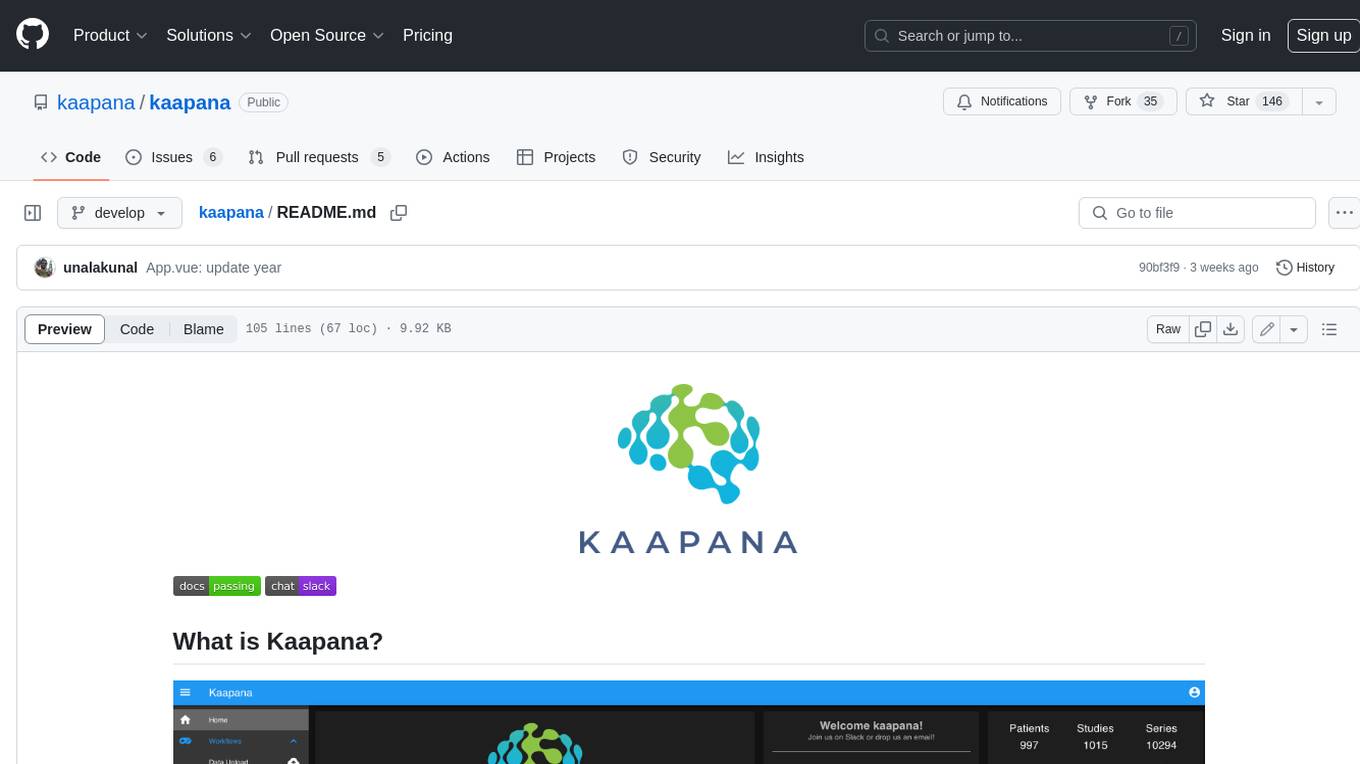
kaapana
Kaapana is an open-source toolkit for state-of-the-art platform provisioning in the field of medical data analysis. The applications comprise AI-based workflows and federated learning scenarios with a focus on radiological and radiotherapeutic imaging. Obtaining large amounts of medical data necessary for developing and training modern machine learning methods is an extremely challenging effort that often fails in a multi-center setting, e.g. due to technical, organizational and legal hurdles. A federated approach where the data remains under the authority of the individual institutions and is only processed on-site is, in contrast, a promising approach ideally suited to overcome these difficulties. Following this federated concept, the goal of Kaapana is to provide a framework and a set of tools for sharing data processing algorithms, for standardized workflow design and execution as well as for performing distributed method development. This will facilitate data analysis in a compliant way enabling researchers and clinicians to perform large-scale multi-center studies. By adhering to established standards and by adopting widely used open technologies for private cloud development and containerized data processing, Kaapana integrates seamlessly with the existing clinical IT infrastructure, such as the Picture Archiving and Communication System (PACS), and ensures modularity and easy extensibility.

universal
The Universal Numbers Library is a header-only C++ template library designed for universal number arithmetic, offering alternatives to native integer and floating-point for mixed-precision algorithm development and optimization. It tailors arithmetic types to the application's precision and dynamic range, enabling improved application performance and energy efficiency. The library provides fast implementations of special IEEE-754 formats like quarter precision, half-precision, and quad precision, as well as vendor-specific extensions. It supports static and elastic integers, decimals, fixed-points, rationals, linear floats, tapered floats, logarithmic, interval, and adaptive-precision integers, rationals, and floats. The library is suitable for AI, DSP, HPC, and HFT algorithms.
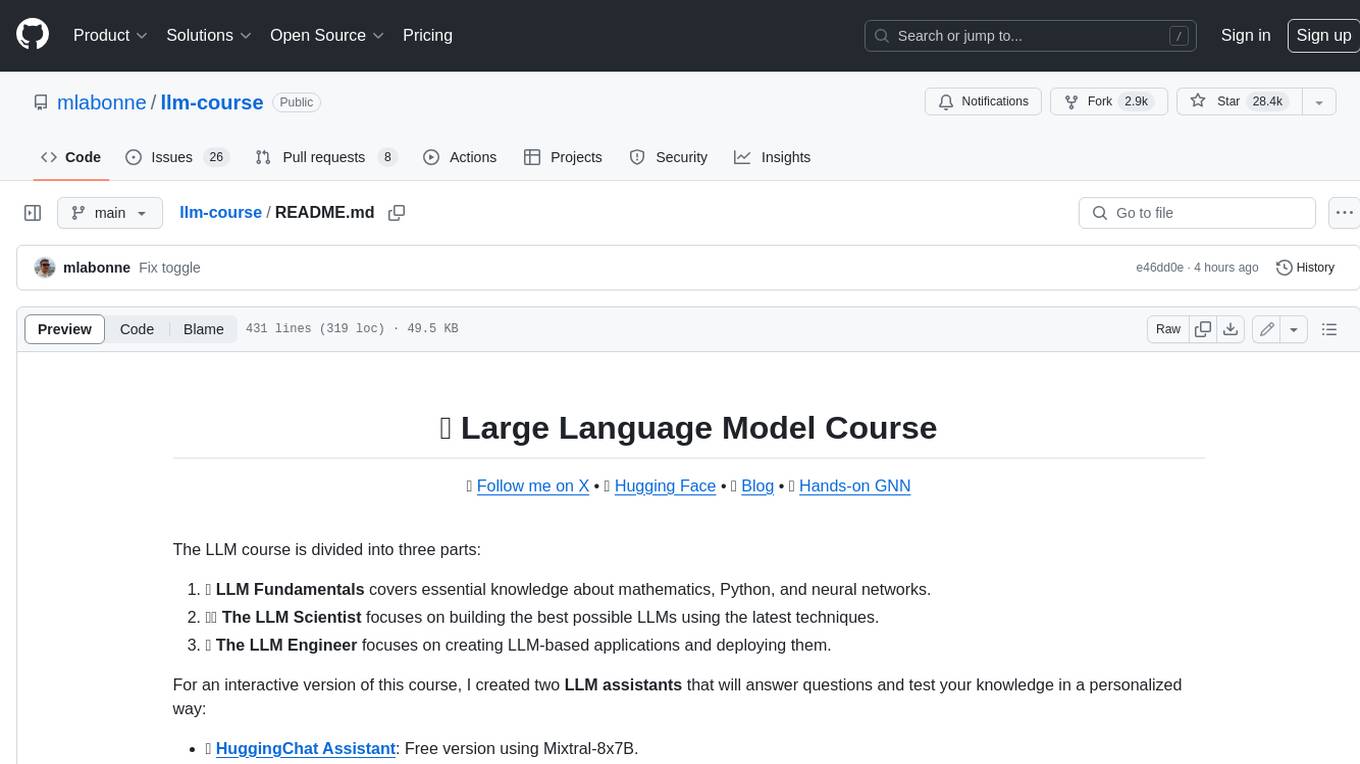
llm-course
The LLM course is divided into three parts: 1. 🧩 **LLM Fundamentals** covers essential knowledge about mathematics, Python, and neural networks. 2. 🧑🔬 **The LLM Scientist** focuses on building the best possible LLMs using the latest techniques. 3. 👷 **The LLM Engineer** focuses on creating LLM-based applications and deploying them. For an interactive version of this course, I created two **LLM assistants** that will answer questions and test your knowledge in a personalized way: * 🤗 **HuggingChat Assistant**: Free version using Mixtral-8x7B. * 🤖 **ChatGPT Assistant**: Requires a premium account. ## 📝 Notebooks A list of notebooks and articles related to large language models. ### Tools | Notebook | Description | Notebook | |----------|-------------|----------| | 🧐 LLM AutoEval | Automatically evaluate your LLMs using RunPod |  | | 🥱 LazyMergekit | Easily merge models using MergeKit in one click. |  | | 🦎 LazyAxolotl | Fine-tune models in the cloud using Axolotl in one click. |  | | ⚡ AutoQuant | Quantize LLMs in GGUF, GPTQ, EXL2, AWQ, and HQQ formats in one click. |  | | 🌳 Model Family Tree | Visualize the family tree of merged models. |  | | 🚀 ZeroSpace | Automatically create a Gradio chat interface using a free ZeroGPU. |  |
20 - OpenAI Gpts
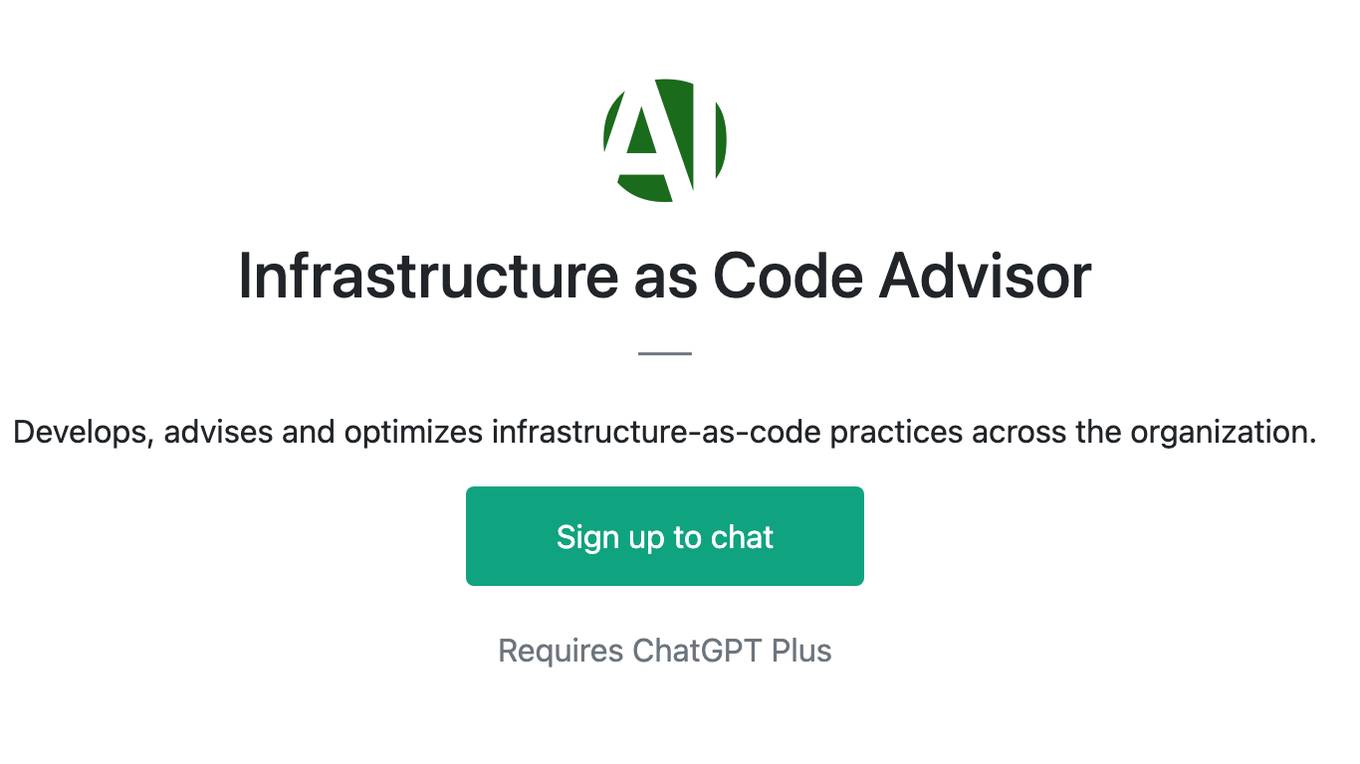
Infrastructure as Code Advisor
Develops, advises and optimizes infrastructure-as-code practices across the organization.
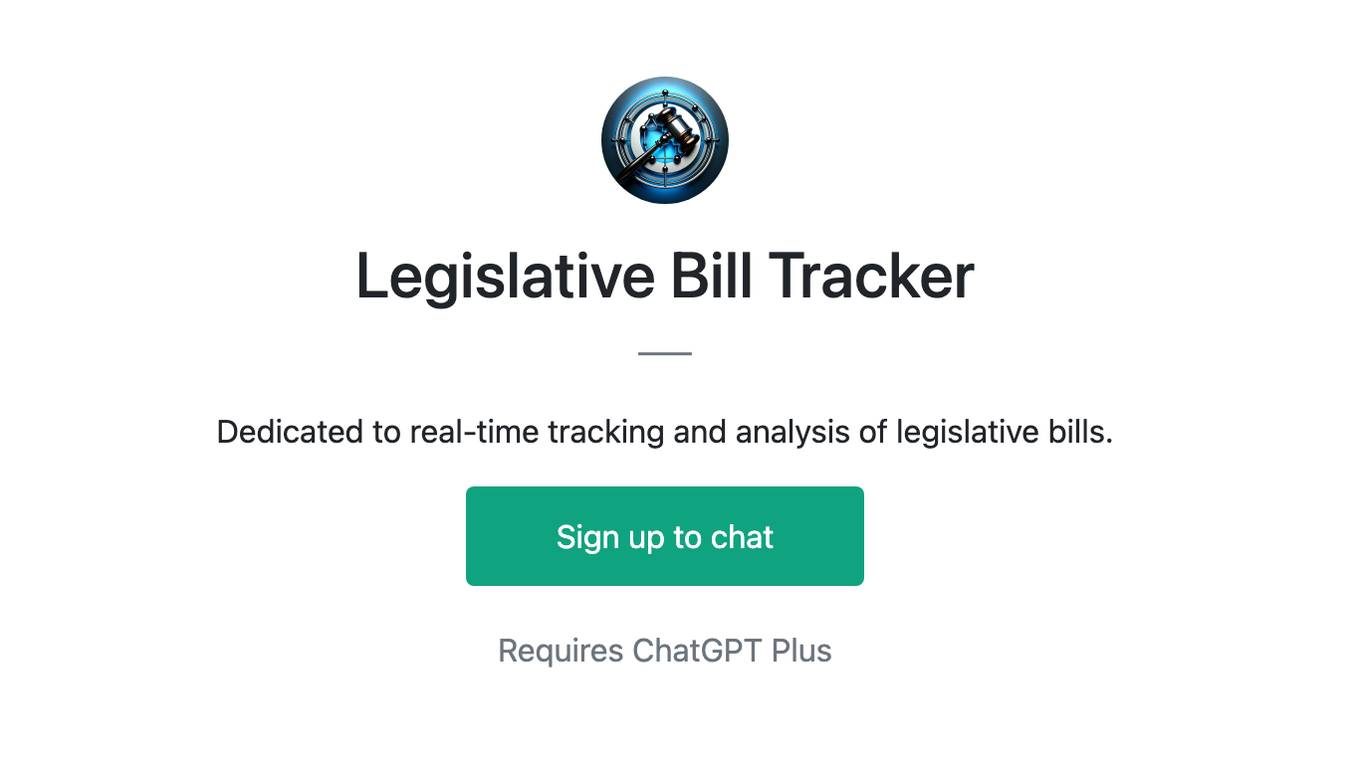
Legislative Bill Tracker
Dedicated to real-time tracking and analysis of legislative bills.
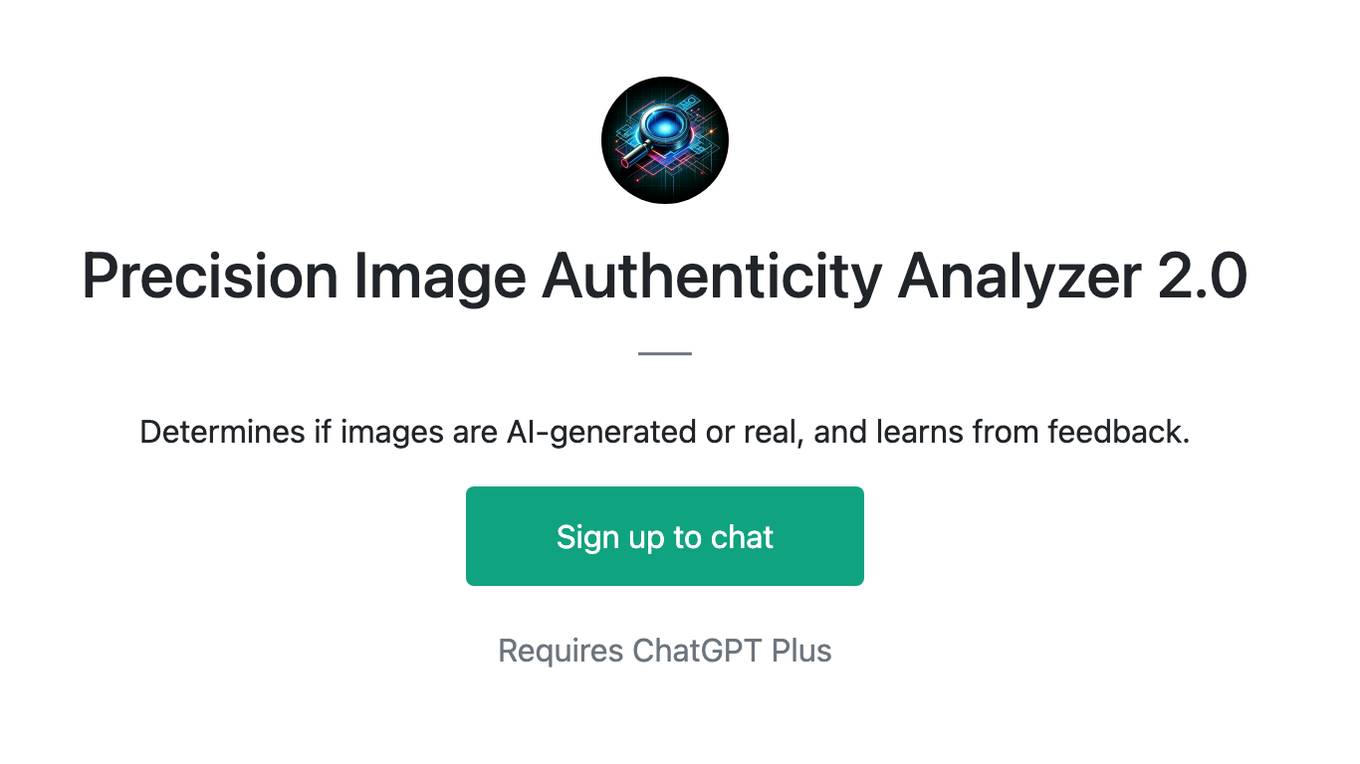
Precision Image Authenticity Analyzer 2.0
Determines if images are AI-generated or real, and learns from feedback.
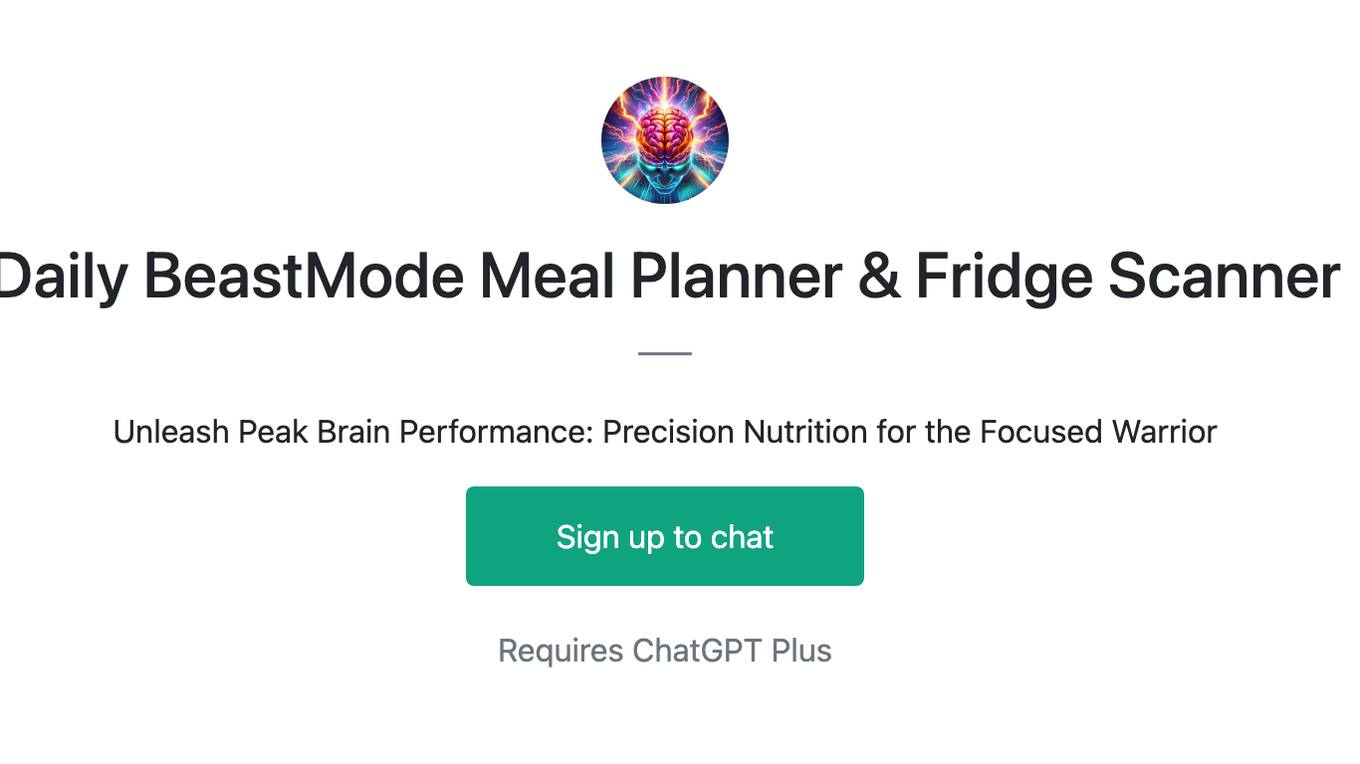
Daily BeastMode Meal Planner & Fridge Scanner
Unleash Peak Brain Performance: Precision Nutrition for the Focused Warrior
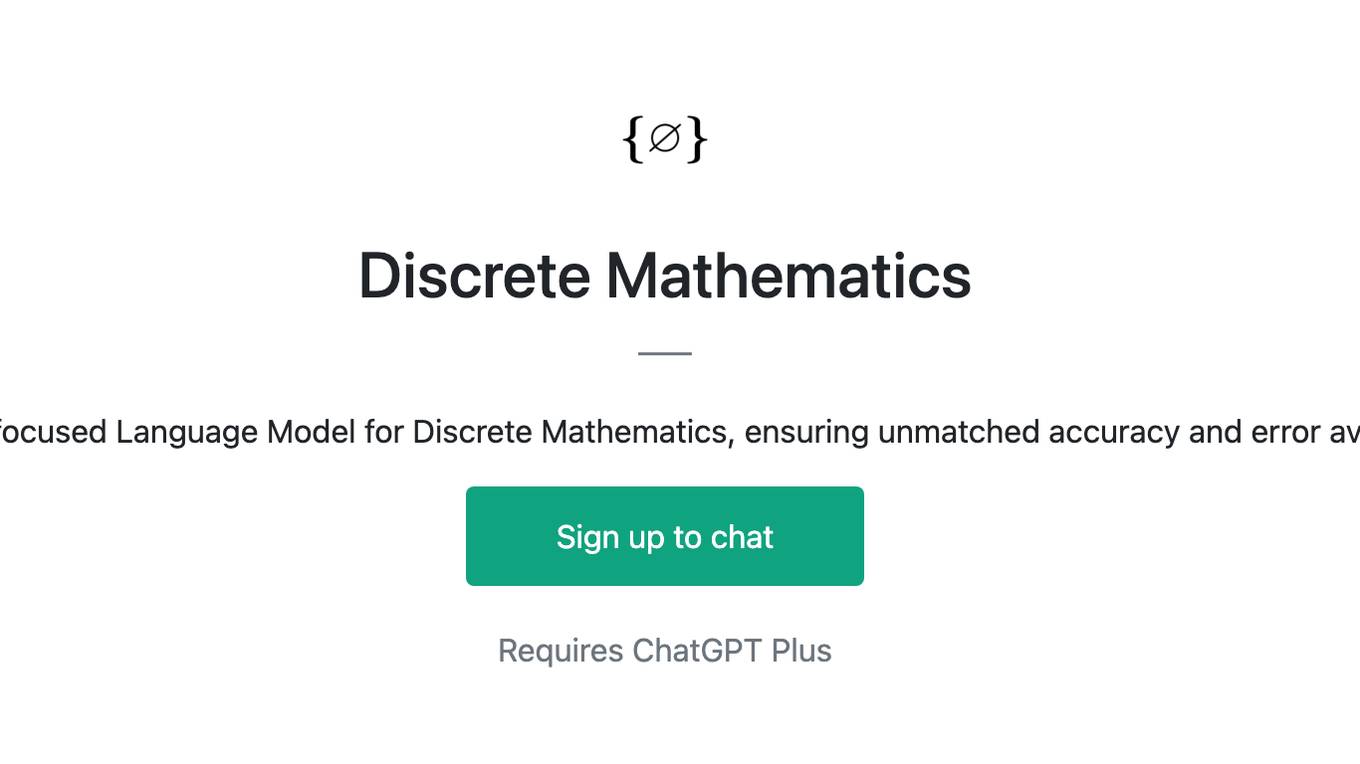
Discrete Mathematics
Precision-focused Language Model for Discrete Mathematics, ensuring unmatched accuracy and error avoidance.
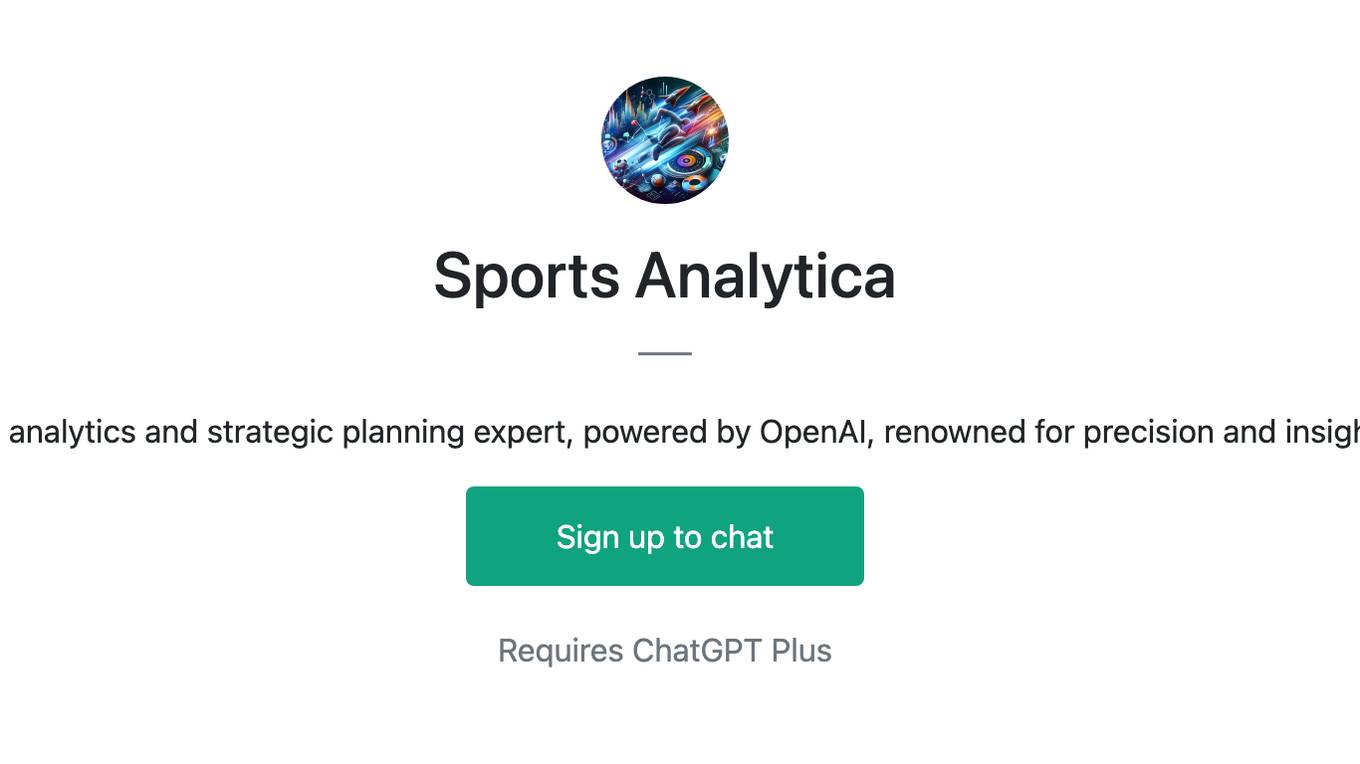
Sports Analytica
Forefront sports analytics and strategic planning expert, powered by OpenAI, renowned for precision and insightful foresight.
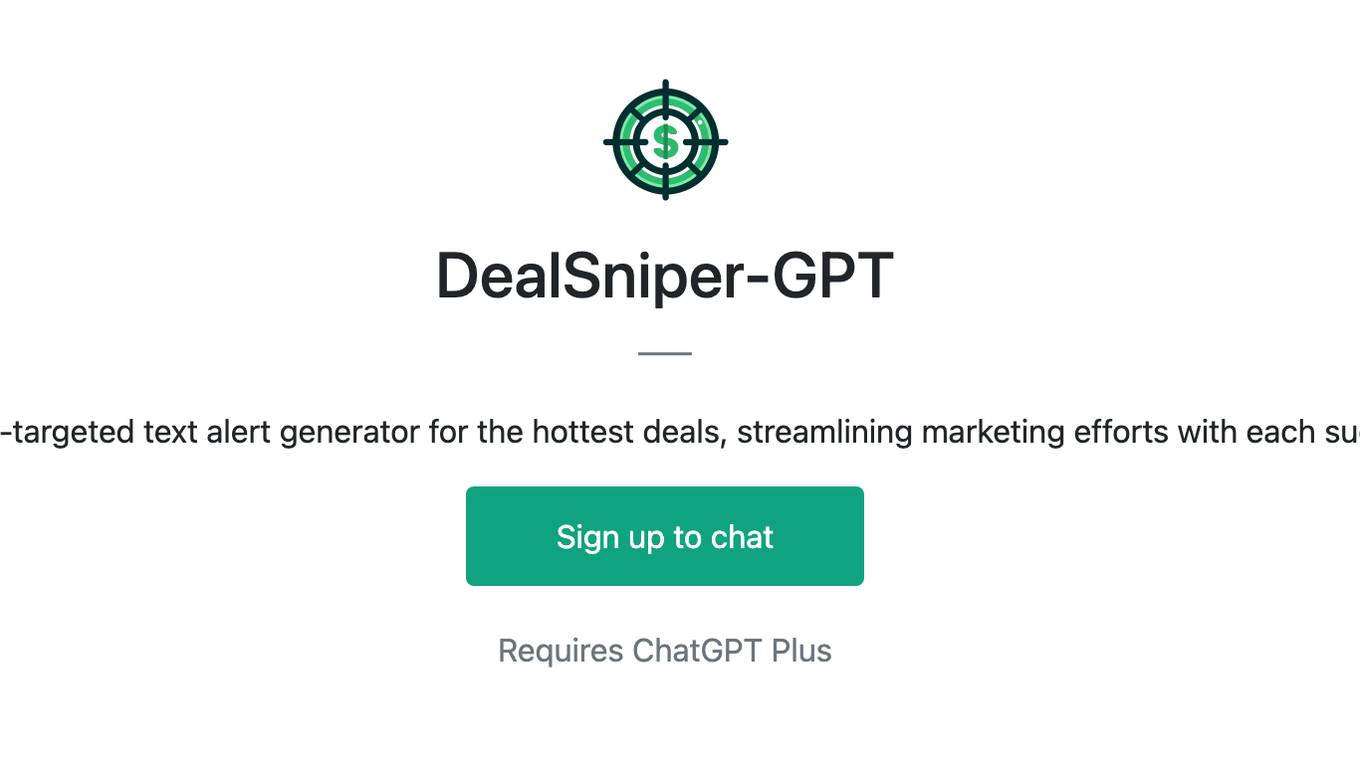
DealSniper-GPT
DealSniper: Your precision-targeted text alert generator for the hottest deals, streamlining marketing efforts with each succinct savings message.

Assignment Helper
I finish student assignments with precision from diploma to master level. Start by giving me your course(example diploma in accounting,) , course subject, theory involved, framework used, the question.
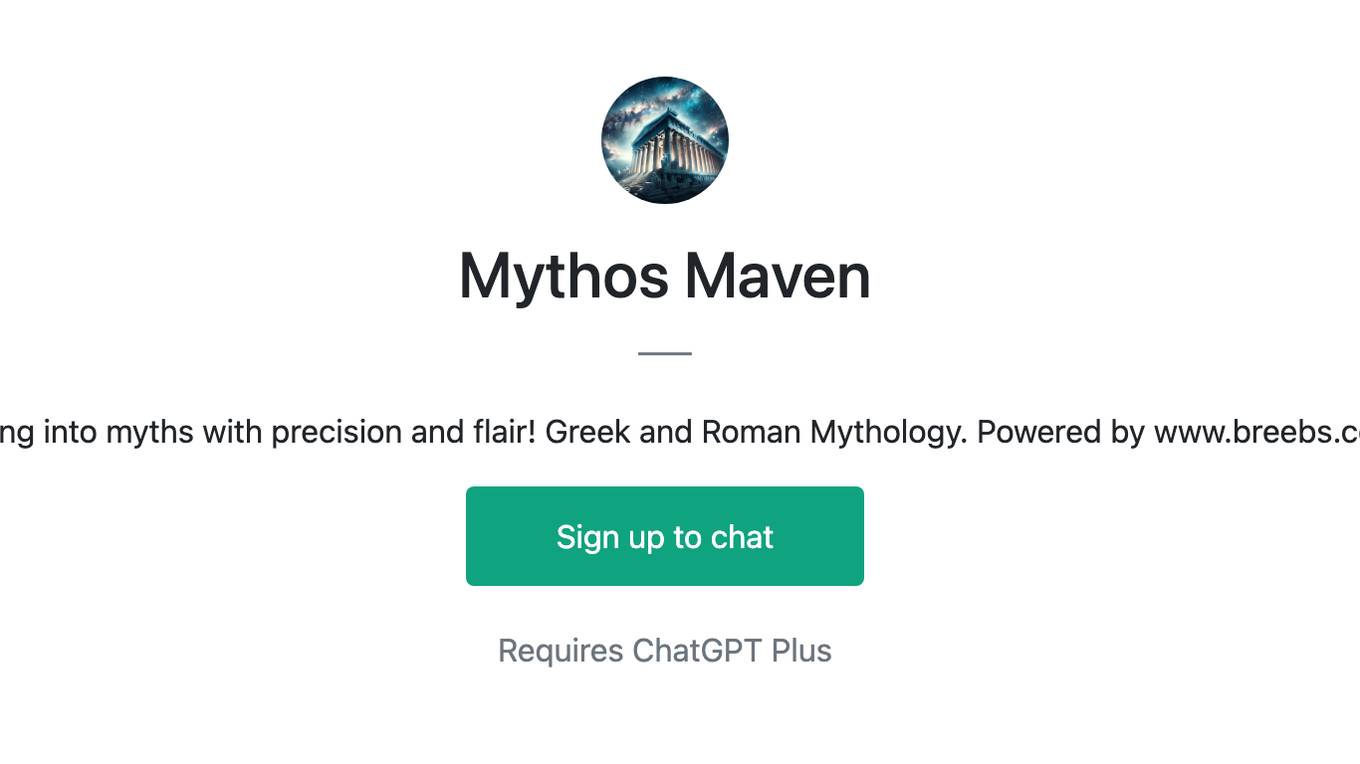
Mythos Maven
Delving into myths with precision and flair! Greek and Roman Mythology. Powered by www.breebs.com
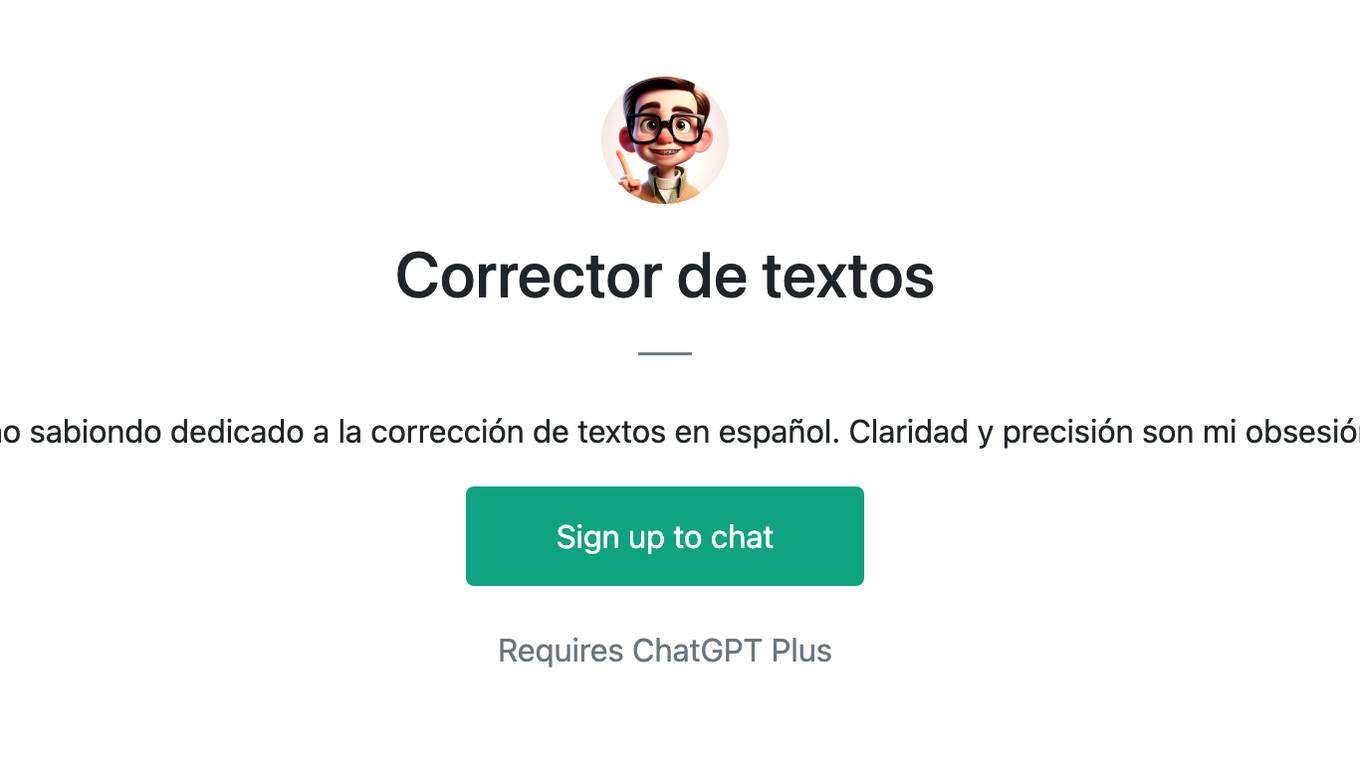
Corrector de textos
Niño sabiondo dedicado a la corrección de textos en español. Claridad y precisión son mi obsesión
